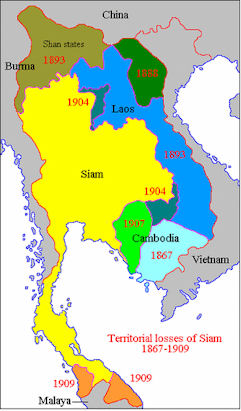

Zitierweise / cite as:
Payer, Alois <1944 - >: Chronik Thailands = กาลานุกรมสยามประเทศไทย. -- Chronik 2003 / B. E. 2546. -- 2. Januar bis Juni. -- Fassung vom 2017-03-20. -- URL: http://www.payer.de/thailandchronik/chronik2003b.htm
Erstmals publiziert: 2012-11-01
Überarbeitungen: 2017-03-20 [Ergänzungen]; 2017-01-02 [Ergänzungen]; 2016-11-10 [Ergänzungen]; 2016-08-16 [Ergänzungen]; 2016-04-18 [Ergänzungen]; 2016-03-16 [Ergänzungen]; 2015-04-06 [Ergänzungen]; 2014-11-21 [Ergänzungen]; 2014-10-16 [Ergänzungen]; 2014-09-16 [Ergänzungen]; 2014-08-27 [Ergänzungen]; 2014-02-20 [Ergänzungen]; 2013-11-01 [Ergänzungen]; 2013-10-08 [Ergänzungen]; 2013-09-27 [Ergänzungen]; 2013-05-24 [Ergänzungen]; 2013-04-25 [Ergänzungen]; 2013-04-21 [Ergänzungen]; 2013-04-07 [Ergänzungen]; 2013-03-21 [Ergänzungen]; 2013-03-09 [Ergänzungen]; 2013-03-05 [Ergänzungen]; 2013-02-12 [Ergänzungen]; 2013-01-13 [Ergänzungen]; 2012-11-13 [Ergänzungen]
©opyright: Dieser Text steht der Allgemeinheit zur Verfügung. Eine Verwertung in Publikationen, die über übliche Zitate hinausgeht, bedarf der ausdrücklichen Genehmigung des Herausgebers.
Dieser Text ist Teil der Abteilung
Thailand von
Tüpfli's Global Village Library
ช้างตายทั้งตัวเอาใบบัวปิดไม่มิด
|
Gewidmet meiner lieben Frau Margarete Payer die seit unserem ersten Besuch in Thailand 1974 mit mir die Liebe zu den und die Sorge um die Bewohner Thailands teilt. |
|
Bei thailändischen Statistiken muss man mit allen Fehlerquellen rechnen, die in folgendem Werk beschrieben sind:
Die Statistikdiagramme geben also meistens eher qualitative als korrekte quantitative Beziehungen wieder.
|
2003-01
Es erscheint das erste Heft der Vierteljahreszeitschrift
ฟ้าเดียวกัน ["Gleicher Himmel"]
Abb.: Titelblatt, 2008-03
2003-01-10 - 2003-01-21
Erstmals findet das Bangkok International Film Festival (เทศกาลภาพยนตร์นานาชาติกรุงเทพฯ) statt.
2003-01-21
Premiere des Films Ong-Bak: Muay Thai Warrior (องค์บาก) von Prachya Pinkaew (ปรัชญา ปิ่นแก้ว, 1962 - ). Er wird national und international ein Kassenschlager.
Abb.: Plakat
[Bildquelle: th.Wikipedia. -- Fair use]
"Ong-Bak (Thai: องค์บาก) ist ein thailändischer Spielfilm aus dem Jahr 2003. Regie bei diesem Kampfkunst-Film führte Prachya Pinkaew (ปรัชญา ปิ่นแก้ว, 1962 - ), das Drehbuch schrieben Suphachai Sithiamphan und Phanna Rithikrai (พันนา ฤทธิไกร, 1961 - ). Die Hauptrolle spielte Tony Jaa (โทนี่ จา, 1976 - ). Baa-Ram-Ewe und Sahamongkolfilm Co. Ltd. produzierten den Film. Handlung
Don, ein junger Geschäftsmann aus Bangkok, reist in sein kleines abgelegenes thailändisches Heimatdorf Nong Pra-du, um dort ein wertvolles Amulett aus dem Gesicht der dort verehrten Buddha-Statue Ong-Bak für seinen Auftraggeber Komtuan zu kaufen. Nachdem ihm aber der Dorfvorsteher die Reliquie nicht verkaufen will, trennt der Geschäftsmann kurzerhand den Kopf des Heiligtums ab, um nicht mit leeren Händen zu seinem Chef zurückzukehren. Der in der „ältesten Kampfsportart der Welt“, Muay Thai (มวยไทย), ausgebildete Ting wird von den Ältesten seines Dorfes beauftragt, das Heiligtum zurückzubringen, da man ohne den Schutz des Buddha eine Katastrophe für die gläubige Gemeinde befürchtet.
Die Spur führt Ting nach Bangkok, wo er Humlae, den Sohn des Dorfvorstehers, aufsuchen soll, der hier fern dem idyllischen Dorfleben eine „vernünftige“ Ausbildung erhalten soll. Doch Humlae, der sich nun George nennt, erweist sich als geldgieriger Gelegenheitsbetrüger, der zusammen mit seiner Partnerin Muay Lek krummen Geschäften nachgeht, um mit den Erlösen auf äußerst brutale illegale Faustkämpfe zu wetten. Humlae verweigert Ting zwar die nötige Unterstützung, nimmt ihn aber dennoch in seine Wohnung auf, als er bei Ting Bargeld entdeckt, das ihm die Dorfbewohner zuvor als Reisegeld mitgegeben haben. Dieses Geld entwendet er Ting, um seiner Wettleidenschaft nachzugehen. Ting merkt aber bald, dass er bestohlen wurde und folgt ihm zu der Kampfarena. Durch Zufall wird er dabei in einen Faustkampf verwickelt, den er mit einer einzigen Aktion für sich gewinnen kann. Die Siegprämie, die für diesen Kampf ausgesetzt war, schlägt er aus, da er „nicht für Geld kämpft“. Er fordert nur das ihm zuvor entwendete Geld zurück.
George erkennt in dem nur wenige Sekunden währenden Kampf Tings außerordentliche Fähigkeiten, die er seinerseits nutzen will, um finanziellen Vorteil daraus zu ziehen. Doch Ting ist an weiteren Kämpfen nicht interessiert und wendet sich von George ab, da er erkennt, dass dieser nicht mehr der ehrenwerte Mann ist, der er mal war. Als George aber kurze Zeit später von seinem Erzfeind Peng und seiner ganzen Gang angegriffen wird, eilt Ting ihm zu Hilfe. Auf der Flucht vor der Gang entdecken die beiden unter Wasser gestohlenes Diebesgut von unzähligen Kunstgegenständen, vor allem buddhistischen Reliquien. Später stellt sich heraus, dass der Organisator der illegalen Faustkämpfe zugleich auch der Hehler der Heiligtümer und zudem noch in Besitz des Ong-Bak ist. Da er durch seinen aufgeflogenen Kunstraub sowie durch hohe Wetten auf Faustkämpfe viel Geld verloren hatte, bietet er George und Ting ein fingiertes Geschäft an: Ting soll in einem Faustkampf gegen seinen Kämpfer absichtlich verlieren, um die Statue zurückzubekommen.
Nach dem Kampf werden George, Ting und Muay Lek verschleppt und sollen getötet werden, da der Geschäftsmann sich nicht an die zuvor gegebene Vereinbarung halten will. Es gelingt dem Trio, ihre vermeintlichen Mörder kampfunfähig zu machen und sie erfahren von einem der Gangster den Aufenthaltsort des Kunsthändlers, der sich in einer Grotte im Hochland Thailands befinden soll. Dort angelangt, kommt es in der Schlusssequenz zu einem Kampf, wobei Ting angeschossen und George verwundet wird und der Geschäftsmann tödlich verunglückt. Nun ist der Weg frei für den Kopf der Buddha-Statue Ong-Bak.
Kritik„In den Actionszenen und Kampfsequenzen ebenso virtuoser wie brutaler Martial-Arts-Film. Während der Hauptdarsteller durchaus ein großes Talent des Genres ist, erweist sich die dünne Geschichte als ebenso spekulativ wie scheinheilig.“
– Lexikon des Internationalen Films
SonstigesAlle Stunts wurden ohne Wire-Effekte gemacht, die Kämpfe nicht mit dem Computer überarbeitet und die meisten Schläge und Tritte in den Kampfszenen nicht, wie in anderen Filmen, an den Schauspielern vorbei, sondern tatsächlich auf den Körper platziert.
Die in Deutschland und größtenteils international erhältliche Version ist der so genannte Besson-Cut des französischen Regisseurs Luc Besson, welcher diesen erstellte. Diese Schnittversion ist 201 Sekunden kürzer als die thailändische Originalfassung und es fehlt die komplette Storyline um Muys Schwester sowie Referenzen für Drogen.
FortsetzungenEine Fortsetzung unter dem Titel Ong-Bak 2 (องค์บาก2) wurde 2007 / 2008 gedreht.
Bei den Internationalen Filmfestspielen von Cannes 2007 hat die deutsche Firma Splendid Films die deutschen Verleihrechte für Ong-bak 2 erworben.
2010 kam mit Ong-Bak 3 (องค์บาก 3) der dritte Teil der Reihe in die Kinos, der an den zweiten Teil anknüpft.
Filmdaten Deutscher Titel Ong-Bak Wächter des Tempels Originaltitel องค์บาก Produktionsland Thailand Originalsprache Thai Erscheinungsjahr 2003 Länge 100 Minuten Altersfreigabe FSK 16 Stab Regie Prachya Pinkaew (ปรัชญา ปิ่นแก้ว, 1962 - ) Drehbuch Suphachai Sithiamphan, (สุภาชัย
Phanna Rithikrai (พันนา ฤทธิไกร, 1961 - )Produktion Prachya Pinkaew, (ปรัชญา ปิ่นแก้ว, 1962 - )
Sukanya Vongsthapat (สุกัญญา วงค์สถาปัตย์)Musik Atomix Clubbing Studio Kamera Nattawut Kittikhun (ณัฐวุฒิ กิตติคุณ) Schnitt Thanat Sunsin, (ธนัติ สุนสิน)
Thanapat Taweesuk (ฐานพัฒน์ ทวีสุข)Besetzung
- Tony Jaa (โทนี่ จา, 1976 - ): Ting (ทิ้ง)
- Petchtai Wongkamlao (เพ็ชรทาย วงษ์คำเหลา, 1965 - ): Humlae (หำแหล่) / George (ยอร์จ)
Pumwaree Yodkamol (ภุมวารี ยอดกมล, 1982 - ): Muay Lek (หมวยเล็ก)
- Suchao Pongwilai (สุเชาว์ พงษ์วิไล, 1946 - ): Komtuan
- Chumphorn Thepphithak (สุเชาว์ พงษ์วิไล, 1939 - ): Onkel Mao
- Chatthapong Pantanaunkul: Saming
- Wannakit Siriput (วรรณกิตย์ ศิริพุฒ): Don (ดอน)
- Chetwut Wacharakun (เชษฐวุฒิ วัชรคุณ, 1975 - ): Peng (เป๋ง)
Rungrawee Barijindakul (รุ้งณภัฐ บริจินดากุล): Ngek (เง็ก)
[Quelle: http://de.wikipedia.org/wiki/Ong-Bak. -- Zugriff am 2012-01-01]
2003-01-26
200 Männer mit schweren Bulldozern zerstören den Nachtmarkt Sukhumvit Square in Bangkok. Dies ist der Höhepunkt der Auseinandersetzung einer seit vier Jahren bestehenden Auseinandersetzung zwischen dem Grundbesitzer und den Pächtern. Ministerpräsident Thaksin sagt, dass er "Mafia-Methoden" nicht toleriere. 140 Verdächtige werden verhaftet. Chuwit Kamolvisit (ชูวิทย์ กมลวิศิษฎ์, 1961 - ), der die Aktion angeordnet haben soll, wird im Mai in einem Massage-Salon verhaftet. Im Juli 2006 wird er freigesprochen.
Abb.: Lage von Sukhumvit Square
[Bildquelle: OpenStreetMap. -- Creative Commons Lizenz (Namensnennung, share alike)]
Abb.: Chuwit Kamolvisit (ชูวิทย์ กมลวิศิษฎ์), 2008
[Bildquelle: Sry85 / Wikipedia. -- Crestive Commons Lizenz (Namensnennung)]
"Chuwit Kamolvisit (Thai: ชูวิทย์ กมลวิศิษฎ์) (born August 29, 1961) is a controversial Thai politician who was once the country's biggest massage parlor owner. After an arrest in 2003, he went public with his claims of having paid large bribes to hundreds of police officers. He then sold some of his massage parlors, formed his own political party and unsuccessfully ran for Bangkok governor in August 2004. In 2005 he was elected for a four-year term to the Thai House of Representatives (สภาผู้แทนราษฎร), but in 2006 the Constitutional Court (ศาลรัฐธรรมนูญ) removed him from parliament. In October 2008 he again ran for governor of Bangkok as an independent but was not elected. In the July 2011 general election his party won four seats in the House of Representatives. Chuwit is the son of a Hong Kong-born ( 香港) Chinese father and a Thai mother. He has sometimes used the pseudonym Davis Kamol. He graduated from the Faculty of Commerce and Accountancy at Thammasat University (มหาวิทยาลัยธรรมศาสตร์), and then earned a Master of Business Administration degree in San Diego, California. He is divorced from his American wife, who lives in the United States with their two children.
Business and allegationsChuwit controls the Davis Group, which owned six luxurious massage parlors near Bangkok's Ratchadaphisek Road: Copacabana, Victoria's Secret, Honolulu, Hi Class, Emmanuelle and Julianna, employing some 600 women. The Davis Group's holdings also include the Davis Hotel and shopping mall on Sukhumvit Soi 24 (สุขุมวิท ซอย 24). Annual revenues have been estimated at about 1 billion baht.
These massage parlors cater mainly to wealthy Thais and operate in a gray area of the law; massage parlors are legal, but prostitution is not. Inside the parlors, some masseuses sit behind a glass window; others wait in a lounge or may be viewed via closed-circuit TV. Once a customer has chosen a masseuse, the couple retire to a room, where he is bathed and the masseuse performs a foam massage using her naked body. This is generally followed by sexual relations. Prices are from 2000 to 5000 baht for a two hour session. Chuwit once claimed in an interview that he was ignorant about what happens in the rooms; however, he has since admitted that prostitution does take place in his parlors.
In January 2003, Chuwit was accused of having hired some 600 men to raze several bars, shops, a laundry and a travel agency on "Sukhumvit Square", a plot of land he owns at Sukhumvit Soi 10 (สุขุมวิท ซอย 10). This was an apparent attempt to remove the low rent tenants so the land could be developed. The tenants had been led to believe they had valid leases from another company and were not notified of the raid, which took place very early on a Sunday morning. Chuwit was arrested and spent a month in jail. He denied responsibility and was finally released on bail.
Angry that police dared to arrest him, he publicly released the amounts of bribes he had regularly paid in the past, along with names of the high ranking police recipients. He put the total amount of bribes at 200 million baht over 10 years, but has since suggested it was closer to 12 million baht. He also claimed that "VIP" policemen received free service in his parlors (an allegation that was later confirmed by interviewing some of the masseuses.) Following an investigation, several prominent policemen were suspended or demoted. Chuwit also accused his prison wardens of having accepted bribes from him.
Shortly after his revelations, Chuwit disappeared for two days. He claimed he had been abducted and abused by police; however, others believe he had staged his own disappearance.
In reprisal, Chuwit's massage parlors were raided and some of his bank accounts frozen. He was also charged with procuring minors for prostitution because three masseues under the age of 18 were found working in one of his parlors. He was acquitted in June 2004, as the court found the girls had used forged ID cards and Chuwit could not be held responsible. The same month, Chuwit sold three of his parlors, saying that police harassment had made operations difficult for him.
The Nation, an English language Thai newspaper, chose Chuwit, along with Pornthip Rojanasunand (พรทิพย์ โรจนสุนันท์) and Chote Wattanachet, as persons of the year for 2003.
In a February 2004 interview, Chuwit claimed that he had paid Thai policemen to clear his Sukhumvit Soi 10 property. When the issue became public, the police had allegedly demanded more money, which he refused to pay. They turned against him, and he revealed his bribe payments in response.
In July 2006, after a three-year trial, Chuwit and 130 associates were acquitted of the charge of razing the bar area; however, a corporate lawyer was sentenced to 8 months in prison for having paid members of the Army Corps Of Engineers to destroy the businesses. Chuwit converted the area on Sukhumvit Soi 10 into a public park named Chuwit Park or Chuvit Garden (สวนชูวิทย์) for about 100 million baht.
Political careerIn September 2003, Chuwit formed his own political party, called First Thai Nation. In April 2004 he announced that he was running for governor of Bangkok. He planned to spend about 20 million Baht on his campaign, with corruption in the police and government as his main campaign topic. The Bangkok governor elections were held on August 29, 2004. Chuwit placed third, with some 300,000 votes, or about 16% of the vote.
For the 2005 legislative elections, Chuwit merged his party with the conservative Chart Thai Party (พรรคชาติไทย). He ran successfully as a party list candidate, becoming a member of parliament in this way.
In May 2005 he began hosting a weekly call-in radio show, during which he listened to complaints from the public.
In January 2006, however, the Constitutional Court revoked his MP status. A candidate must be a member of a political party for at least 90 days before the general election and the court found that Chuwit had not joined Chart Thai in time.
In 2008, he again declared his candidacy for the Governorship of Bangkok. As was the case in 2004, he placed third. He admitted that his campaign may have suffered when he beat up a journalist who supposedly described him as "unmanly".
In May 2011 Chuwit formed a new political party, "Love Thailand" (พรรครักประเทศไทย, Rak Prathetthai). In the 2011 Thai general election, the party won four seats in the House of Representatives. He had campaigned as a protest candidate and anti-corruption watchdog."
[Quelle: http://en.wikipedia.org/wiki/Chuwit_Kamolvisit. -- Zugriff am 2011-12-31]
2003-01-28
Die Zeitung The Nation über Banharn Silpa-archa (บรรหาร ศิลปอาชา, 1932 - ):
Abb.: Lage von Chiang Mai [เชียงใหม่] und Suphan Buri [สุพรรณบุรี]
[Bildquelle: CIA. -- Public domain]
"Thaksin has asked the leader of the Chat Thai Party [พรรคชาติไทย], a government coalition member, to help improve the cityscape and restore the beauty of the northern city of Chiang Mai [เชียงใหม่], the premier's hometown. Banharn has a reputation as a rigorous hands-on manager. His constituency of Suphan Buri [สุพรรณบุรี] is regarded as the best-looking and best-managed of Thailand's cities, clean and well-maintained, with wide roads and good lighting. However, the former prime minister is often accused of using his position to channel a disproportionate amount of money to his province. Banharn recently dismissed the allegations as a gross misunderstanding, saying: "Suphan Buri has the same budget as every other province, but I personally ensure that it is properly used. I make certain that municipal officials do their duty and I personally inspect different sites in the city on a weekly basis."
Can Chiang Mai expect such a transformation? "No," the Chat Thai leader confessed, saying it took him some 20 years to make Suphan Buri, a much smaller city than Chiang Mai, what it is today. Banharn is scheduled to visit Chiang Mai once a month this year. He is in contact with various city authorities to ensure they share his aim to make the city look better.
"We may have to remove existing soil on traffic islands along main roads and replace it with better quality soil. The original contractors did not care what soil they used, so now nothing grows properly. In particular, I would like to see improvements to the Chiang Mai-Mae Rim road." However, Banharn was reluctant to put a timeframe on Thaksin's request that he improve Chiang Mai's city landscape. "It's a tough city to handle," he said. "But let's see area by area how it can be improved."
[Fair use]
2003-01-29
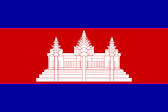
Tausende von Kambodschanern setzen die Thai-Botschaft in Phnom Penh (ភ្នំពេញ) in Brand und randalieren in der Stadt gegen Thai-Besitz. Der Thai-Botschafter muss fliehen, um sein Leben zu retten. Auslöser: die Thai-Schauspielerin Suvanant "Kob" Kongying (สุวนันท์ "กบ" คงยิ่ง, 1978 - ) soll gemäß einem Boulevard-Blatt behauptet haben, Angkor Wat (អង្គរវត្ត) gehöre zu Thailand. Kambodscha und Thailand rufen ihre Botschafter zurück, alle Grenzübergänge werden geschlossen. Die Thaibotschaft bleibt bis Februar 2004 geschlossen. In Thailand vermutet man, dass die kambodschanische Regierung den Mob aufgestachelt hat, um Nationalismus zu aktivieren: heuer sind Wahlen.
Abb.: Lage von Angkor Wat (អង្គរវត្ត) und Phnom Penh (ភ្នំពេញ)
[Bildquelle: OpenStreetMap. -- Creative Commons Lizenz (Namensnennung, share alike)]
Abb.: Angkor Wat (អង្គរវត្ត), 2002
[Bildquelle: Pigalle. -- http://www.flickr.com/photos/pigalleworld/5062373560/. -- Zugriff am 2012-04-25. -- Creative Commons Lizenz (Namensnennung, keine kommerzielle Nutzung, share alike)]
Abb.: Suvanant "Kob" Kongying (สุวนันท์ "กบ" คงยิ่ง)
[Bildquelle: th.Wikipedia. -- Fair use]
"In January 2003, a Cambodian newspaper article falsely alleged that a Thai actress claimed that Angkor Wat (អង្គរវត្ត) belonged to Thailand. Other Cambodian print and radio media picked up the report and furthered the nationalistic sentiment which resulted in riots in Phnom Penh (ភ្នំពេញ) on January 29 where the Thai Embassy was burned and commercial properties of Thai businesses were vandalized. The riots reflect the fluid historical relationship between Thailand and Cambodia, as well as the economic, cultural and political factors involving the two countries. [...]
Cause of the riotsThe January 2003 riots were prompted by an article in the Cambodian Rasmei Angkor (Light of Angkor) newspaper on January 18. The article alleged that a Thai actress, Suvanant Kongying (สุวนันท์ คงยิ่ง), had said that Cambodia had stolen Angkor, and that she would not appear in Cambodia until it was returned to Thailand. The newspaper’s editor gave the source for the story as a group of Khmer nationalists who said they had seen the actress on television. No evidence to support the newspaper’s claim has ever emerged, and it seems that the report was either fabricated or arose from a misunderstanding of what Suvanan’s character had said. It has also been suggested that the report was an attempt by a rival firm to discredit the actress, who was inter alia the “face” of a cosmetics company.
The report was picked up by Khmer radio and print media, and copies of the Rasmei Angkor article were distributed in schools. On January 27, the Cambodian prime minister Hun Sen (ហ៊ុន សែន) repeated the allegations, and said that Suvanant was “not worth a few blades of grass near the temple”. On January 28, the Cambodian government then banned all Thai television programs in the country.
The riotsOn January 29, rioters attacked the Thai embassy in Phnom Penh, destroying the building. Mobs also attacked the premises of Thai-owned businesses, including Thai Airways International (การบินไทย) and Shin Corp (ชิน คอร์ปอเรชั่น), owned by the family of then Thai prime minister, Thaksin Shinawatra (ทักษิณ ชินวัตร). A photograph of a Cambodian man holding a burning portrait of the revered King Bhumibol Adulyadej enraged many Thai people.
The Thai government sent military aircraft to Cambodia to evacuate Thai nationals, while Thais demonstrated outside the Cambodian embassy in Bangkok.
Responsibility for the riots was disputed: Hun Sen attributed the government’s failure to prevent the attacks to “incompetence”, and said that the riots were stirred up by “extremists”. The chairman of the National Assembly, Prince Norodom Ranariddh (នរោត្ដម រណឬទ្ធិ) claimed that opposition leader Sam Rainsy (សម រង្ស៊ី) had directed the attacks. Rainsy said that he had attempted to prevent the violence.
The aftermathThe Thai government closed the country’s border with Cambodia following the riots, but only to Thai and Cambodian nationals. At no point was the border ever closed to foreigners or Western tourists. The border was re-opened on 21 March 2003, following the Cambodian government’s payment of $6 million compensation for the destruction of the Thai embassy. In a 2006 rally against Thai Prime Minister Thaksin Shinawatra, several influential Thai diplomats, including former ambassador to the UN Asda Jayanama (อัษฎา ชัยนาม) and former ambassador to Vietnam Supapong Jayanama, alleged that only half of the compensation was actually paid. The Thai Ministry of Foreign Affairs has denied this accusation. The Cambodian government also agreed to compensate individual Thai businesses for the losses which they had suffered, to be negotiated separately.
Shortly after the riots, a wave of arrests - more than 150 persons - was criticized by human rights groups, highlighting irregularities in the procedures and denial by the authorities to monitor their detention conditions. The owner of Beehive Radio, Mr. Mom Sonando, and Chan Sivutha, Editor-in-Chief of Reaksmei Angkor, were both arrested without warrants, charged with incitement to commit a crime, incitement to discrimination and announcement of false information. They were later on released on bail and no trial was ever made."
[Quelle: http://en.wikipedia.org/wiki/2003_Phnom_Penh_riots. -- Zugriff am 2011-01-31]
2003-01-30
Die Marine versenkt vor Ko Phai (เกาะไผ่) ihr Landungsschiff HTMS Kram, um als Grundlage für Riffbildung zu dienen. HTMS Kram, ein Veteran aus dem 2. Weltkrieg, war 1962 von den USA an Thailand verschenkt worden.
Abb.: Lage von Ko Phai (เกาะไผ่)
[Bildquelle: OpenStreetMap. -- Creative Commons Lizenz (Namensnennung, share alike)]
Abb.: Ko Phai (เกาะไผ่)
[Bildquelle: ©Google earth. -- Zugriff am 2012-04-25]
2003-01-31
Ministerpräsident Thaksin gelobt, bis zum 30. April illegale Drogen in Thailand auszurotten. Daraufhin startet er einen blutigen Krieg gegen Drogen. In den drei folgenden Monaten werden nach offiziellen Angaben ca. 2.300 Personen getötet, sei es im Kampf von Drogengang gegen Drogengang, sei es durch die Sicherheitskräfte.
"Thaksin initiated several highly controversial policies to counter a perceived boom in the Thai drug market, particularly in methamphetamine. Earlier policies like border blocking (most methamphetamine is produced in Myanmar), education, sports, and promoting peer pressure had proved ineffective. In a 4 December 2002 speech on the eve of his birthday, King Bhumibol noted the rise in drug use and called for a "War on Drugs." Privy Councillor Phichit Kunlawanit called on the government to use its majority in parliament to establish a special court to deal with drug dealers, stating that “if we execute 60,000 the land will rise and our descendants will escape bad karma”.[80] On 14 January 2003, Thaksin launched a campaign to rid "every square inch of the country" of drugs in three months.[81] It consisted of changing the punishment policy for drug addicts, setting provincial arrest and seizure targets including "blacklists", awarding government officials for achieving targets and threatening punishment for those who failed to make the quota, targeting dealers, and "ruthless" implementation. In the first three months, Human Rights Watch reports that 2,275 people were killed, almost double the number normally killed in drug-related violence.[82][83] The government claimed that only around 50 of the deaths were at the hands of the police, the rest being drug traffickers who were being silenced by their dealers and their dealers' dealers. Human rights critics claimed a large number were extrajudicially executed.[84][85] The government went out of its way to publicize the campaign, through daily announcements of arrest, seizure, and death statistics.
According to the Narcotics Control Board, the policy was effective in reducing drug consumption, especially in schools, by increasing the market price.[86]
King Bhumibol, in a 2003 birthday speech, praised Thaksin and criticized those who counted only dead drug dealers while ignoring deaths caused by drugs.[87]
"ไอ้การชัยชนะของการปราบไอ้ยาเสพติดนี่ ดีที่ปราบ แล้วก็ที่เขาตำหนิบอกว่า เอ้ย คนตาย ตั้ง ๒,๕๐๐ คน อะไรนั่น เรื่องเล็ก ๒,๕๐๐ คน ถ้านายกฯ ไม่ได้ทำ นายกฯ ไม่ได้ทำ ทุกปี ๆ จดไว้นะ มีมากกว่า ๒,๕๐๐ คนที่ตาย" "Victory in the War on Drugs is good. They may blame the crackdown for more than 2,500 deaths, but this is a small price to pay. If the prime minister failed to curb [the drug trade], over the years the number of deaths would easily surpass this toll.[88]"Bhumibol also ask the commander of the police to investigate the killings.[89] Police Commander Sant Sarutanond reopened investigations into the deaths, and again claimed that few of the deaths were at the hands of the police.
The war on drugs was widely criticized by the international community. Thaksin requested that the UN Commission on Human Rights send a special envoy to evaluate the situation, but said in an interview, "The United Nations is not my father. I am not worried about any UN visit to Thailand on this issue."[90]
After the 2006 coup, the military junta appointed a committee to investigate the anti-drug campaign.[91] Former Attorney General Kanit Na Nakorn led the committee. Concerning the committee's results The Economist reported in January 2008: "Over half of those killed in 2003 had no links to the drugs trade. The panel blamed the violence on a government 'shoot-to-kill' policy based on flawed blacklists. But far from leading to the prosecutions of those involved, its findings have been buried. The outgoing interim prime minister, Surayud Chulanont, took office vowing to right Mr Thaksin's wrongs. Yet this week he said there was insufficient evidence to take legal action over the killings. It is easy to see why the tide has turned. Sunai Phasuk, a researcher for Human Rights Watch, a lobbying group, says that the panel's original report named the politicians who egged on the gunmen. But after the PPP won last month's elections, those names were omitted."[92]
While he was opposition leader, Abhisit Vejjajiva accused Thaksin of crimes against humanity for his alleged role in the campaign. After being appointed Prime Minister, Abhisit opened an investigation into the killings, claiming that a successful probe could lead to prosecution by the International Criminal Court. Former attorney-general Kampee Kaewcharoen led the investigation and the investigation committee was approved by Abhisit's Cabinet. Abhisit denied that the probe was politically motivated. Witnesses and victims were urged to report to the Department of Special Investigation, which operated directly under Abhisit's control.[93][94][95] As of the August 2011 parliamentary elections, Abhisit's investigation failed to find or publicize any evidence linking Thaksin or members of his Government to any extrajudicial killings.
- Michael K. Connors, Ambivalent About Rights: “Accidental” Killing Machines, Democracy and Coups D’etat., Draft paper presented to Human Rights in Asia Workshop, University of Melbourne, October 1-2, 2009.
- Anucha Yuwadee, Bangkok Post, 15 January 2003
- National News Bureau of Thailand, Academics call for law to prosecute Thaksin in World Court, 28 June 2010
- "The War on Drugs, HIV/AIDS, and Violations of Human Rights in Thailand". Human Rights Watch. "Beginning in February 2003, the Thaksin government instructed police and local officials that persons charged with drug offenses should be considered "security threats" and dealt with in a "ruthless" and "severe" manner. The result of the initial three-month phase of this campaign was some 2,275 extrajudicial killings"
- "A Wave of Drug Killings Is Linked to Thai Police" By Seth Mydans, 8 April 2003 New York Times [4]
- Amnesty International report: Thailand: Grave developments – Killings and other abuses.
- Thailand: Public Senses War On Drugs Futile 20 March 2005
- "พระ ราชดำรัส พระราชทานแก่คณะบุคคลต่างๆ ที่เข้าเฝ้าฯ ถวายชัยมงคล ในโอกาสวันเฉลิมพระชนมพรรษา ณ ศาลาดุสิดาลัย สวนจิตรลดา พระราชวังดุสิตฯ วันพฤหัสบดีที่ ๔ ธันวาคม พ.ศ. ๒๕๔๖ (ฉบับไม่เป็นทางการ)". The Golden Jubilee Network. "ไอ้การชัยชนะของการปราบไอ้ยาเสพติดนี่ ดีที่ปราบ แล้วก็ที่เขาตำหนิบอกว่า เอ้ย คนตาย ตั้ง ๒,๕๐๐ คน อะไรนั่น เรื่องเล็ก ๒,๕๐๐ คน ถ้านายกฯ ไม่ได้ทำ นายกฯ ไม่ได้ทำ ทุกปี ๆ จดไว้นะ มีมากกว่า ๒,๕๐๐ คนที่ตาย ที่ตายทั้งคนที่เสพติด แล้วก็ขึ้นไป ฆ่าคน หรือทำอะไร เผาอะไรต่าง ๆ รวมทั้งเจ้าหน้าที่ที่ต้องไปปราบปกติ ก็ตายมากเหมือนกัน แต่ไม่พูดเท่านั้นเอง ไม่ไปนับ แต่นี้เขาก็นับไปชี้ ชี้ ชี้นับ พวกที่ค้า พวกที่ทำ ก็ตายเยอะเหมือนกัน ก่อนนี้ แต่ไม่พูดถึง เชื่อว่าพอๆ กับที่ได้จดว่า มีผู้ที่ตายในการสงครามต่อสู้ยาเสพติด ที่ทราบว่าคนตาย เพราะยาเสพติดนี่ มากมาย"
- Asia Sentinel The Long Wait for Justice in Thailand, 10 August 2007
- (Thai) Royal Jubilee Network, 2003 Birthday Speech of King Bhumibol Adulyadej
- March 2003 "DRUG-RELATED KILLINGS: Verify the toll, say diplomats". The Nation. 4 March 2003.
- "Kanit to chair extrajudicial killings probe" Bangkok Post, 3 August 2007[dead link]
- "Thailand's drug wars. Back on the offensive" 24 January 2008 The Economist
- Thailand Times, Thaksin’s ‘Drug Murders’ investigated, 10 June 2010
- Extra-juridical killing cases by Thaksin government investigated again in Thailand
- National News Bureau of Thailand, Academics call for law to prosecute Thaksin in World Court, 28 June 2010"
[Quelle: http://en.wikipedia.org/wiki/Thaksin_Shinawatra#The_.27War_on_Drugs.27. -- Zugriff am 2011-12-30]
2003-02-04

Asiaweek <Hong Kong>: Where old ways die hard : In the provinces, patronage politics still rules / By Sangwon Suh and Julian Gearing / Suphan Buri (สุพรรณบุรี)
Abb.: Lage der Provinz Suphan Buri (สุพรรณบุรี)
Bildquelle: [Bildquelle: CIA. -- Public domain]
"Attention to detail is Banharn's [Banharn Silpa-archa - บรรหาร ศิลปอาชา, 1932 - ] forte. Ordering the changing of a lightbulb or chastising contractors over the quality of the varnished floor in a sparkling new basketball stadium is all in a weekend's work for the former premier. A self-confessed workaholic, 65-year-old Banharn is a key mover and shaker in his home province of Suphan Buri [สุพรรณบุรี] in central Thailand. His supporters claim no one has done more for the development of the area than Banharn. [...]
Banharn reckons there is nothing wrong with the arrangement. "I think it is the same practice everywhere in the world," he says. "The MPs have to do something good for their constituencies or they will not be elected. Look at the United States. President Bill Clinton has done a lot for his home state of Arkansas." He then points to Japan and South Korea: "What I have heard is they also spend a lot of money and give out gifts to people in their constituency. Would this be considered vote-buying?"
[Quelle: http://edition.cnn.com/ASIANOW/asiaweek/98/0619/nat3.html. -- Zugriff am 2014-11-21. -- Fair use]
2003-02-08

Das Volunteer Defence Corps (Or Sor) (อส. = กองอาสารักษาดินแดน) hält Tausende von kambodschanischen Händlern ab, die in den Provinzen Sa Kaew (สระแก้ว) und Chantaburi (จันทบุรี) die Grenze überschreiten wollen. Grund sind die Anti-Thai-Demonstrationen in Phnom Penh (ភ្នំពេញ, siehe oben!)
Abb.: Lage der Provinzen Sa Kaew (สระแก้ว) und Chantaburi (จันทบุรี) siwe von Phnom Penh (ភ្នំពេញ)
[Bildquelle: CIA. -- Public domain]
2003-02-13

Tod von Walt Whitman Rostow (1916 - 2003)
Abb.: Einbandtitel eines Buchs über Walt Whitman Rostow und seine Rolle im Vietnamkrieg
"Walt Whitman Rostow (* 7. Oktober 1916 in New York City; † 13. Februar 2003 in Austin, Texas) war ein US-amerikanischer Ökonom, Wirtschaftshistoriker und von 1960 bis 1969 Regierungsmitglied der USA. Leben
Walt Whitman Rostow wurde 1916 als Kind der russischen Immigranten Viktor Aaron und Lillian Rostow in New York geboren. Im Alter von 15 Jahren absolvierte er 1932 das High-School-Examen in New Haven und erhielt ein Stipendium für das Studium der Volkswirtschaftslehre und Geschichte in Yale. Im Jahr 1936 erhielt Rostow das renommierte Rhodes-Stipendium, das ihm ermöglichte, von 1936 bis 1938 am Balliol College der University of Oxford zu studieren. Er promovierte 1940 in Yale mit seiner Dissertation British Trade Fluctuations, 1868–1896. Darauf unterrichtete Rostow für ein Jahr Wirtschaftswissenschaft an der Columbia University.
Nach dem Eintritt der USA in den Zweiten Weltkrieg wurde Rostow 1941 Mitglied des Office of Strategic Services unter William Joseph Donovan. Nach dem Krieg lehrte er von 1946 bis 1947 als Harmsworth Professor für Geschichte in Oxford. In den folgenden Jahren lehrte Rostow an der Columbia University und dem Massachusetts Institute of Technology (MIT). 1957 wurde er in die American Academy of Arts and Sciences gewählt.
1958 wurde Rostow zum Redenschreiber von Präsident Dwight D. Eisenhower (1890 - 1969). 1960 berief John F. Kennedy (1917 - 1963) ihn in sein Wahlkampfteam. Nach Kennedys Wahl legte Rostow seine Arbeit am MIT nieder und arbeitete als Sicherheitsberater, später im Außenministerium als Leiter des Politischen Planungsstabes (Director of Policy Planning). Ebenfalls 1960 erschien sein viel beachtetes und diskutiertes Buch The Stages of Economic Growth: A Non-Communist Manifesto, als neuer Beitrag zu den Modernisierungsmodellen.
Nach der Ermordung Kennedys im November 1963 setzte er seine Arbeit unter dem neuen Präsidenten Lyndon B. Johnson (1908 - 1973) fort. Anfang 1966 wurde Rostow zum Nationalen Sicherheitsberater ernannt; dieses Amt behielt er bis zum Januar 1969. Dabei geriet er zunehmend in die Kritik, ein Hauptverantwortlicher für die Eskalation des Vietnamkriegs zu sein. Mit der Wahl von Richard Nixon (1913 - 1994) 1969 zum Präsidenten der Vereinigten Staaten schied Rostow aus der Politik aus.
Da ihm das MIT eine Rückkehr auf seinen alten Lehrstuhl verwehrte, nahm er eine Stelle an der Lyndon B. Johnson School of Public Affairs an der University of Texas in Austin als Junior Professor Emeritus an. Dort unterrichtete er Ökonomie und Geschichte bis zu seinem Tod 2003."
[Quelle: https://de.wikipedia.org/wiki/Walt_Whitman_Rostow. -- Zugriff am 2016-03-16]
2003-02-14
Premiere des Films February (กุมภาพันธ์) von Yuthlert Sippapak (ยุทธเลิศ สิปปภาค, 1966 - )
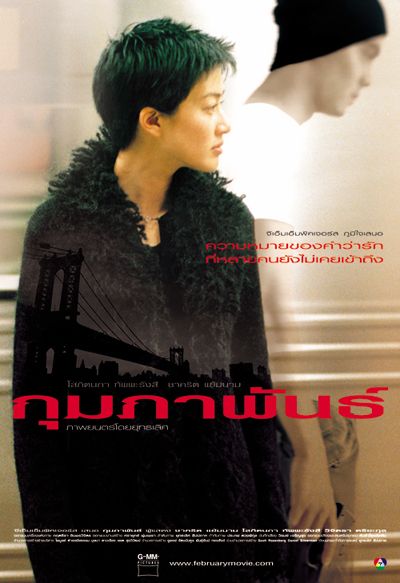
Abb.: Plakat
[Bildquelle: Wikipedia. -- Fair use]
|
"February (Thai: กุมภาพันธ์ or Khumphaphan) is a 2003 Thai romance-drama film, written and directed by Yuthlert Sippapak (ยุทธเลิศ สิปปภาค, 1966 - ). The plot involves a young Thai woman with a terminal illness who goes to New York City to live her final months, is hit by a car and then develops amnesia, forgetting that she's in need of medical care. Cast
[Quelle: http://en.wikipedia.org/wiki/February_%282003_film%29. -- Zugriff am 2013-03-20] |
2003-02-15

Ca. 3.000 Personen demonstrieren vor der US-Botschaft in Bangkok gegen Pläne der USA, den Irak anzugreifen.
Abb.: Lage der US-Botschaft
[Bildquelle: OpenStreetMap. -- Creative Commons Lizenz (Namensnennung, share alike)]
2003-02-19
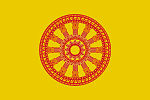
Kanchana Spindler in Bangkok Post:
"The question comes to mind of just how violent a society we are. After all, we claim to be a predominantly Buddhist nation and if most people claim to subscribe to Buddhism’s basic tenets then we shouldn’t tolerate violence against one another at any cost. In reality, of course, we are probably much less Buddhist than we might like to claim."
2003-02-21

The Young Muslim Association of Thailand (YAMAT, สมาคมยุวมุสลิมแห่งประเทศไทย - ยมท.) ruft als Protest gegen den geplanten Irak-Krieg zum Boykott von US-Waren auf.
2003-02-21
Premiere des Films Cheerleader Queens (ว้ายบึ้ม! เชียร์กระหึ่มโลก) von Poj Arnon (พจน์ อานนท์)

Abb.: Plakat
[Bildquelle: Wikipedia. -- Fair use]
|
"Cheerleader Queens (Thai: ว้ายบึ้ม! เชียร์กระหึ่มโลก; aka I'm Lady) is a 2003 Thai film directed by Poj Arnon Poj Arnon (พจน์ อานนท์). PlotFour kathoey (กะเทย)—Mod, Som, Kam-pang and Wa-wa—move from a rural town to attend St. Mary's High School in Bangkok. Once there they try to join the school's cheerleading team, only to be rejected because of their sexuality. Instead they join the school's struggling rugby team, making friends with the other team members after they score a number of tries in an important game. Toey, another kathoey from the boys hometown, comes to Bangkok with the idea of forming a new cheerleading team, which they name "The Queen". From the start the boys have to face a number of problems, but with the help of their friends on the rugby team they manage to get to the finals of the national cheerleading competition. ReceptionRonnie Scheib of Variety reviewed Cheerleader Queens at the 2004 New York Lesbian, Gay, Bisexual, & Transgender Film Festival. He described the film as, "A fun date flick for all persuasions, with sexual content limited to a few chaste kisses and endless eye-batting innuendo, kitschy curio should perform cheerily on the gay fest circuit."[1]" [Quelle: http://en.wikipedia.org/wiki/Cheerleader_Queens. -- Zugriff am 2013-03-20] |
2003-02-24
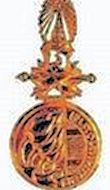
Zu National Artists (ศิลปินแห่งชาติ) werden ernannt:
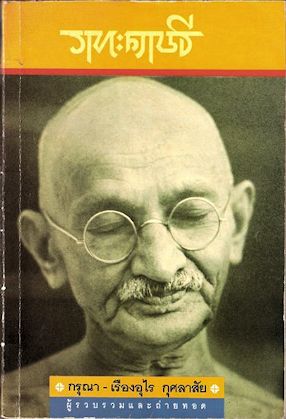
Abb.: Einbandtitel eines Buchs von Karuna Kusiralai (นายกรุณา-เรืองอุไร
กุศลาสัย)
[Fair use]
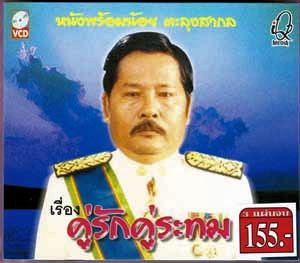
Abb.: VCD-Titel von Prom Bunrit (นายพร้อม บุญฤทธิ์
= พร้อมน้อย ตลุงสากล)
[Fair use]
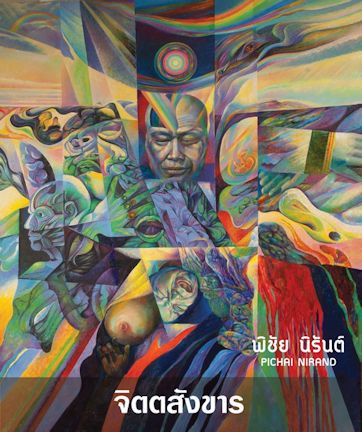
Abb.: Plakat für eine Ausstellung von Pichai Nirand (นายพิชัย นิรันต์),
2011
[Fair use]
2003-02-28
Dr. Chatsumarn Kabilsingh (ฉัตรสุมาลย์ กบิลสิงห์, 1944 - ) wird in Sri Lanka in der Theravadatradition zur bhikkhunī (Nonne) ordiniert. Ihr Ordensname ist Dhammananda Bhikkhuni (ภิกษุณีธัมมนันทา).
Abb.: Lage von Sri Lanka
[Bildquelle: OpenStreetMap. -- Creative Commons Lizenz (Namensnennung, share alike)]
Abb.: Dhammananda Bhikkhuni (ภิกษุณีธัมมนันทา), 2009
[Bildquelle: Gakuro / Wikipedia. -- GNU FDLicense]
"Dhammananda Bhikkhuni (Thai: ภิกษุณีธัมมนันทา, Aussprache: [pʰík-sù-niː tʰam-má-nan taː]; * 6. Oktober 1944 in Bangkok) ist die erste voll ordinierte Nonne (Bhikkhuni) des Theravada-Buddhismus in Thailand. Geboren 1944 als Chatsumarn Kabilsingh (Thai: รศ.ดร. ฉัตรสุมาลย์ กบิลสิงห์), erhielt sie ihre Vollordination in Sri Lanka 2003 und leitet seit dem Tod ihrer Mutter im gleichen Jahr das einzige Nonnenkloster Wat Songdhammakalyani (Thai: วัดทรงธรรมกัลยาณี) in Nakhon Pathom (นครปฐม) und wird von ihren Anhängern 'Luang Mae' (หลวงแม่) genannt. Sie hatte sich kurz nach ihrer Pensionierung als Professorin der Thammasat-Universität (มหาวิทยาลัยธรรมศาสตร์ ) in Bangkok entschlossen, buddhistische Nonne zu werden. Leben
Chatsumarn Kabilsingh wurde 1944 dem Ehepaar Frau Voramai Kabilsingh (Thai: นางวรมัย กบิลสิงห์) und Herrn Kokiat Satsen (Thai: นายก่อเกียรติ ษัฏเสน) geboren. Ihr Vater war Parlamentsabgeordneter aus der südlichen Provinz Trang (ตรัง). Ihre Mutter Voramai war Lehrerin, Journalistin und Schriftstellerin und ließ sich 1956 als Mae Chi (แม่ชี) ordinieren und war schließlich die erste Frau in Thailand, die 1971 in Taiwan eine volle Nonnenordination erhielt. Sie verwandelte ihr Haus in einen Tempel, in dem auch ihre Tochter Chatsumarn aufwuchs. Nach ihrer Schulausbildung studierte Chatsumarn Kabilsingh in Indien und Kanada und schloss mit einem Doktorat (Ph.D.) in buddhistische Studien an der Magadh-Universität in Bodhgaya (बोधगया) ab. Sie war verheiratet und 27 Jahre lang als Professorin für Philosophie und Religion der Thammasat-Universität in Bangkok tätig. Als ihre drei Söhne erwachsen waren und sie 2000 als Professorin emeritierte, folgte sie dem Weg ihrer Mutter und strebte die Ordination als buddhistische Nonne an. 2001 erhielt sie in Sri Lanka ihre erste Ordination und wurde 2003 als erste Frau in Thailand eine vollordinierte Bhikkhuni der Theravada Tradition. Über die Widerstände und Anfeindungen seitens des konservativen Mönchs-Establishments und der damit eng verflochtenen Regierungsstellen berichtet sie im April 2005 auf der „International Conference on Thai Studies“ Dr. Chatsumarn Kabilsingh ist Autorin und Übersetzerin zahlreicher Bücher und Artikel über Buddhismus in Asien, Buddhismus und Frauen, sowie Buddhismus und Ökologie.
WirkenDhammananda Bhikkhuni ist eine Pionierin für die Frauenrechte in Thailand, insbesondere was das Recht der Frauen auf höhere Nonnenordination und Bildung betrifft. Sie gilt auch als Verfechterin eines Engagierten Buddhismus. 1984 beginnt sie mit der Publikation von „Yasodhara“, einem Journal über Aktivitäten buddhistischer Frauen. 1987 ist sie Mitbegründerin der internationalen buddhistischen Frauenorganisation Sakyadhita, deren ersten Kongress sie 1991 in Bangkok organisiert. Dhammananda Bhikkhuni und ihre Arbeit wird von einigen aufgeschlossenen Mönchen in Thailand, von prominenten Vertretern des Engagierten Buddhismus, wie Sulak Sivaraksa (สุลักษณ์ ศิวรักษ์) und von buddhistischen Feministinnen, wie Rita Gross und anderen unterstützt. 2005 wurde sie für den Friedensnobelpreis nominiert.
Werke (Auswahl)
- A Comparative Study of Bhikkhunã Pàtimokkha. Chaukhambha Orientalia: India, 1981.
- Thai Women in Buddhism.Berkeley, CA: Parallax Press, 1991.
- Women in Buddhism: Questions and Answers.First published 1998. ISBN: 9745726079; Als E-Book: [1]
- The Structural Violence Against Women. Nakhonpathom 2005."
[Quelle: http://de.wikipedia.org/wiki/Dhammananda_Bhikkhuni. -- Zugriff am 2011-12-28]
2003-02-28
Premiere des Films Sayew (สยิว) von Kongdej Jaturanrasamee (คงเดช จาตุรันต์รัศมี, 1972 - ) und Kiat Songsanant (เกียรติ ศงสนันทน์, 1971 - )
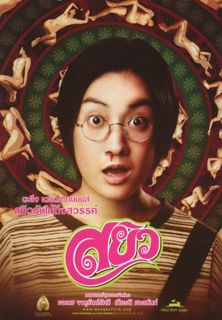
Abb.: Plakat
[Bildquelle: Wikipedia. -- Fair use]
|
"Sayew (Thai: สยิว, also Spasm or X-Rated Sex Story: Fact or Fiction) is a 2003 Thai comedy film about a naive female college student who works as a writer of erotic stories for a pornographic magazine. PlotTao (เต่า) is a tomboyish university student who supports her studies by writing for her uncle's racy pulp pornographic magazine Sayew (สยิว), despite the fact that she has never had sex herself. The magazine is struggling financially, so Tao's uncle, Dr. Porn, tells her she needs to spice up her stories or else be sacked. After writing fantasties about her neighbors doesn't work, Tao takes the advice of her uncle and starts reaching for first-hand experience to draw on, turning to the macho magazine photographer and writer, Young Stallion. However, the sexually uncertain Tao also has fantasies about a female classmate, Mui (หมวย). Cast
Festivals and awards Sayew was screened at several film festivals in 2003, including the Deauville Asian Film Festival, the Vancouver International Film Festival and the Stockholm International Film Festival. At the Seattle International Film Festival, the film won an honorable mention for the Asian Trade Winds Award." [Quelle: http://en.wikipedia.org/wiki/Sayew. -- Zugriff am 2003-03-20] |
2003-03-01
Chaleo Yoovidhya (เฉลียว อยู่วิทยา, 1932 - 2012), Erfinder des Energy-Drinks Krating Daeng (กระทิงแดง), der Vorstufe zum Verkaufsschlager Red Bull, ist nach Forbes nun Dollar-Miliardär.
Abb.: Chaleo Yoovidhya (เฉลียว อยู่วิทยา)
[Bildquelle: th.Wikipedia. -- Fair use]
"Chaleo Yoovidhya (Thai: เฉลียว อยู่วิทยา, [ʧà.liǎo jùː.wít.tʰá.jaː]; * 1932 - 2012-03-17 - 2012) ist ein thailändischer Geschäftsmann und Milliardär. Er ist Eigentümer der Unternehmen T. C. Pharmaceuticals und T. C. Agrotrading, die Krating Daeng produzieren und 49 % an Red Bull halten, sowie 50%-Eigner des auf Ausländer spezialisierten Piyavate Hospital in Bangkok. Sein Sohn Chalerm hält weitere 2% an Red Bull, womit die Familie Yoovidhya offiziellen Angaben zufolge die Mehrheit besitzt. Auf der Liste der World’s Richest People rangiert Yoovidhya 2005 an 292. Stelle. Yoovidhya ist verheiratet und hat fünf Kinder."
[Quelle: http://de.wikipedia.org/wiki/Chaleo_Yoovidhya. -- Zugriff am 2011-12-31]
2003-03-11
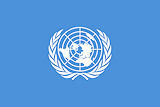
Der Internationale Strafgerichtshof (International Criminal Court) in Den Haag nimmt seine Arbeit auf.
Abb.: ®Logo
[Bildquelle: Wikipedia]
2003-03-14
Thai Post Tabloid [ไทยโพสต์ แทบลอยด์]: เราผิดหวังรัฐบาล - เหวง โตจิราการ และ สมศักดิ์ โกศัยสุข [Wie are disappointed with the government - Weng Tojirakarn <1951 - > and Somsak Kosaisuk <1945 - >]
"After the demonstration of state enterprise workers, he [Prommin] called me. So I told him [Than] as a Phu Yai [important person] of this country he should be generous and open-minded and listen to Phu Noi [ordinary citizens] like us. He should look on us with a friendly attitude, not as an enemy. ... I also suggested a referendum on this matter. But he refused and argued that it was too late. But I think nothing is too late for improving any law regarding public affairs." [Übersetzung: Kanokrat Lertchoosakul [กนกรัตน์ เลิศชูสกุล]: The rise of the Octobrists in contemporary Thailand : power and conflict among former left-wing student activists in Thai politics. -- New Haven : Yale University Southeast asia Studies, 2016. -- 364 S. 23 cm. -- (Yale Southeast Asia studies ; monograph 65). -- ISBN 9780985042943. -- Zugl. The London School of Economics and Political Science, thesis 2012-09. -- S. 241. -- Fair use]
2003-03-15

Der Nationale Volkskongress Chinas wählt Hu Jintao (胡锦涛, 1942 - ) zum Staatspräsidenten.
Abb.: Hu Jintao (胡锦涛) / von Murray Webb (1947 - ), 2008
[Bildquelle: Hu Jintao. 29 November, 2008.. Webb, Murray, 1947- :[Digital caricatures published from 29 July 2005 onwards (2006, 2007, 2008). Includes a selection of digital caricatures published from 2002 and up to July 2005.]. Ref: DCDL-0008720. Alexander Turnbull Library, Wellington, New Zealand. http://natlib.govt.nz/records/23056870. -- Zugriff am 2013-03-09. -- "You can copy this item for personal use, share it, and post it on a blog or website. It cannot be used commercially without permission"]
Abb.: Hu Jintao (胡锦涛)
[Bildquelle: DonkeyHotey. -- http://www.flickr.com/photos/donkeyhotey/5653898348/in/photostream. -- Zugriff am 2012-01-04. -- Creative Commons Lizenz (Namensnennung)]
2003-03-16

Wen Jiabao (温家宝, 1942 - ) wird Ministerpräsident Chinas.
Abb.: Wen Jiabao (温家宝) / von Murray Webb (1947 - ), 2007"The cartoon shows Chinese President, Hu Jintao [richtig: Wen Jiabao], standing on top of the Beehive which is twisting out of shape under his weight. Hu Jintao waves a Chinese flag. In the forefront stands the Dalai Lama, spiritual leader of Tibet, and Prime Minister, Helen Clark, leans out from behind the Beehive with a little wave at the Dalai Lama. Refers to a visit to New Zealand in June 2007 by the Dalai Lama during which there was no formal meeting with the government or the opposition. The reason for this was assumed to be New Zealand's desire for free trade with China and it therefore not being seen as politic to be too friendly with the Dalai Lama because of strained relations between China and Tibet. Helen Clark did meet the Dalai Lama 'by chance' at an Australian airport."
[Bildquelle: Buckling under pressure. 18 June, 2007.. Webb, Murray, 1947- :[Digital caricatures published from 29 July 2005 onwards (2006, 2007, 2008). Includes a selection of digital caricatures published from 2002 and up to July 2005.]. Ref: DCDL-0003482. Alexander Turnbull Library, Wellington, New Zealand. http://natlib.govt.nz/records/22905576. -- Zugriff am 2013-03-09. -- "You can copy this item for personal use, share it, and post it on a blog or website. It cannot be used commercially without permission"
2003-03-20

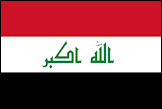
Angriff der USA auf Irak. Beginn des Irak-Kriegs. Thailand nimmt am Krieg mit ca. 450 Militärs teil. Die Thai Militärs nehmen zum Schutz mehr als 6000 Buddha-Amulette (พระ), Yantras (ยันต์) und Phallusse (ลึงค์) mit.
Abb.: Lage des Irak
[Bildquelle: OpenStreetMap. -- Creative Commons Lizenz (Namensnennung, share alike)]
Abb.: Präsident George W. Bush kündigt die Operation Iraqi Freedom an, 2003-03-19
[Bildquelle: White House photo by Paul Morse / Wikipedia. -- Public domain]
Abb.: George W. Bush / von Murray Webb (1947 - ), 2007"Caricature of President George Bush, dressed as a cowboy, being lowered by rope onto a Baghdad cityscape from a helicopter hovering above. Bush draws a comparison between the Iraq and Vietnam wars by suggesting that America withdrew too soon from Vietnam and must not make the same mistake with Iraq, particularly as the war with Iraq could follow the United States home."
[Quelle von Bild und Text: George Bush. "Unlike in Vietnam, if we withdraw before the job is done, this enemy will follow us home." 24 August, 2007.. Webb, Murray, 1947- :[Digital caricatures published from 29 July 2005 onwards (2006, 2007, 2008). Includes a selection of digital caricatures published from 2002 and up to July 2005.]. Ref: DCDL-0003772. Alexander Turnbull Library, Wellington, New Zealand. http://natlib.govt.nz/records/22499550. -- Zugriff am 2013-03-09. -- "You can copy this item for personal use, share it, and post it on a blog or website. It cannot be used commercially without permission"]
Abb.: Für den Irak-Krieg verantwortliche Regierung Bush
Von links nach rechts: Paul Wolfowitz (Stellvertretender Verteidigungsminister), Colin Powell (Außenminister), Dick Cheney (Vizepräsident), Condoleezza Rice (Sicherheitsberaterin), Donald Rumsfeld (Verteidigungsminister), George W. Bush (Präsident)
[Bildquelle: DonkeyHotey. -- http://www.flickr.com/photos/donkeyhotey/9600656966/. -- Zugriff am 2013-09-27. -- Creative Commons Lizenz (Namensnennung, share alike)]
Abb.: Verlauf des Irak-Kriegs bis 2007
[Bildquelle: ADran / Wikipedia. -- GNU FDLicense]
Abb.: Britisches SA80-Gewehr (Small Arms for the 80s), das auch im Irak-Krieg eingesetzt wird, Übung des US Marine Corps, Hawaii, 2000
[Bildquelle: LCPL SIMON MARTIN, USMC / Wikimedia. -- Public domain]
2003-03-31
Alle Reisenden aus Hong Kong, China, Taiwan und Vietnam dürfen auf Anordnung des Gesundheitsministeriums 14 Tage lang nach ihrer Einreise nicht in die Öffentlichkeit gehen. Damit will man verhindern, dass SARS (Severe Acute Respiratory Syndrome) nach Thailand eingeschleppt wird. In Thailand werden in der Folgezeit 9 Fälle von SARS registriert, von denen zwei tödlich waren.
Abb.: Ansteckungswege von SARS durch einen einzigen Hotelgast, 2003-03-28]
[Bildquelle: CIA / Wikipedia. -- Public domain]
Abb.: Lungenentzündung durch SARS
[Bildquelle: CDC / Wikipedia. -- Public domain]
"Als SARS-Pandemie 2002/2003 wird das erste − gleich weltweite − Auftreten des vom SARS-assoziierten Coronavirus hervorgerufenen Schweren Akuten Atemwegssyndroms (SARS) bezeichnet, das im November 2002 begann. Von Südchina ausgehend verbreitete sie sich binnen weniger Wochen über nahezu alle Kontinente und forderte innerhalb eines halben Jahres knapp 1000 Menschenleben. Die Weltgesundheitsorganisation unterschied zwischen Staaten, in denen lokale Infektionsketten bestanden, das heißt Neuansteckungen auftraten, und Ländern, in denen die Erkrankung nur bei Reisenden auftrat, die sich in den Ländern der ersten Kategorie infiziert hatten. Staaten mit lokalen Infektionsketten waren die Volksrepublik China, Hong Kong, Singapur, Kanada, Vietnam, Taiwan, die Vereinigten Staaten und das Vereinigte Königreich. Die Prävalenz der Seuche lag bei 150 pro Milliarde Einwohner. Als erste Pandemie des 21. Jahrhunderts weckte sie neue Ängste in der Bevölkerung und wurde weltweit in großem Rahmen von den Medien begleitet. Ihr erlagen außerhalb Asiens 50 Menschen und sie ist ein gutes Beispiel für die rasche Ausbreitung einer Krankheit in der vernetzten, globalisierten Welt."
[Quelle: http://de.wikipedia.org/wiki/SARS-Pandemie_2002/2003. -- Zugriff am 2011-12-31]
2003-03-31

Erstmals tritt der Deutsch-Thailändische Gemischte Wirtschaftsausschuss (GWA) zusammen.
"Der Deutsch-Thailändische Gemischte Wirtschaftsausschuss dient dazu, im Austausch von Politik und Wirtschaft Möglichkeiten für den Ausbau der wirtschaftlichen Zusammenarbeit beider Länder zu diskutieren. Ziele sind insbesondere die Verbesserung der bilateralen Wirtschafts- und Geschäftsbeziehungen, die Förderung von Unternehmenskooperation sowie ein schneller Fortschritt bei der Verbesserung der wirtschaftlichen Rahmenbedingungen." [Quelle: http://www.bmwi.de/DE/Presse/pressemitteilungen,did=300722.html. -- Zugriff am 2016-01-03]
2003-04-01 - 2010-02-25
Moderine TV sendet über 1700 Folgen der Game Show Tod Sa Gun Game (เกมทศกัณฐ์).
"The Tod Sa Gun Game (เกมทศกัณฐ์ in Thai, named for the 10-faced giant in the Ramayana story) is a Thai game show produced by Workpoint Entertainment. It was the 2003 runner-up, and the 2005 winner, of the "best game or quiz show on Asian television" award. In the original format, a contestant was shown 10 faces. They have to name them all in order to win 10 million baht. It was the first game show to have a ten million baht jackpot, the highest at the time.
The show has won a number of awards from many institutions in Thailand and Asia, including runner-up and highly commended of best game or quiz programme in the Asian Television Awards of 2003 and 2005, respectively.
In the one-on-one game, a player tries to score as many points as possible by telling the name of the given face within one minute. The game continues as far as player gives correct answers, then the other contestant starts. The minimum prize is one million baht when one month later the prize will be add another million until maximum prize of 10 million. Later, the jackpot was fixed at 10 million.
[...]
ControversyWhile the show is popular, it has faced accusations that the programme is rigged. Internet webboard posters, such as in Pantip.com, have alleged that the game is set up to make more appealing players win (like the original Quiz Show.) The allegation first started after a woman had scored 50 consecutive wins. In 2006, the accusation started again after a young boy had 200 wins in the kids edition. It was noted that Phanya Nirunkul (ปัญญา นิรันดร์กุล, 1954 - ), the show's host and Workpoint's owner, gave a lot of support to the child. For example, Phanya gave the boy a green suit of his own (at the time, the host wore a green suit). There was a pocketbook written about the boy's success in the game published by Phanya's company, even before he had reached his 200 wins. After the boy was done with the quiz show, he became a co-host of a variety show under Workpoint. All in all, it look like a big setup to promote an unknown boy to fame and reap a long-term rating from his popularity. A young girl has also had 200 consecutive wins in the kids edition, and the allegation has started flying around internet webboards once again."
[Quelle: http://en.wikipedia.org/wiki/Tod_Sa_Gun_Game. -- Zugriff am 2012-03-07]
2003-04-04
Tod des Dichters Khamphun Bunthawi (คำพูน บุญทวี, geb. 1928). Er ist der populärste Dichter Nordostthailand. Er ist u.a. Verfasser von ลูกอีสาน ("Kind Nordostthailands", 1976). Seine Kremation findet in Gegenwart von Prinzessin Sirindhorn (ศาสตราจารย์กิตติมศักดิ์ ดร. พลเอกหญิง พลเรือเอกหญิง พลอากาศเอกหญิง สมเด็จพระเทพรัตนราชสุดา เจ้าฟ้ามหาจักรีสิรินธร รัฐสีมาคุณากรปิยชาติ สยามบรมราชกุมารี, 1955 - ) statt.
Abb.: Khamphun Bunthawi (คำพูน บุญทวี)
[Bildquelle: th.Wikipedia]
2003-04-04
Premiere des Films Sanghorn (สังหรณ์) von den Bang Brüdern (彭氏兄弟, 1965 - )
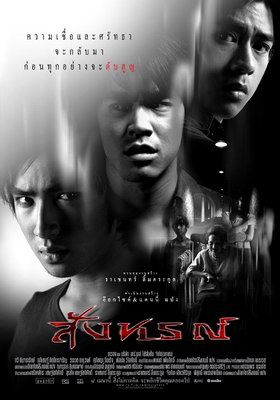
Abb.: Plakat
[Bildquelel: Wikipedia. -- Fair use]
|
"Sanghorn (Thai: สังหรณ์, English title: Omen) is a 2003 Thai suspense film. It was written by the Pang Brothers (彭氏兄弟, 1965 - ) and starred Kawee Tanjararak (กวี ตันจรารักษ์, 1980 - ) (Beam - บีม), Panrawat Kittikorncharoen (ปาณรวัฐ กิตติกรเจริญ, 1982 - 2007) (Big - บิ๊ก) and Worrawech Danuwong (วรเวช ดานุวงศ์, 1964 - ) (Dan - แดน) - all members of a popular Thai boyband at the time, D2B (ดีทูบี) . PlotStrange things start happening when separate twists of fate bring each of three friends, Big, Dan and Beam, into contact with three strangers - an old woman who tells prophecies, a little girl who sells garlands on the street and a young woman named Aom ((อ้อม)). What none of them realize is that not only is there a connection between the three females, but also between the guys themselves and their destinies. But it starts to become clear that one them is fated to die. But which one? And why? Cast
[Quelle: http://en.wikipedia.org/wiki/Sung_horn. -- Zugriff am 2013-03-20] |
2003-04-11

Premiere des Films Angulimala (องคุลิมาล) von Sutape Tunnirut (สุเทพ ตันนิรัตน์).
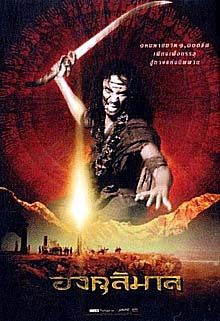
Abb.: Plakat
[Bildquelle: Wikipedia. -- Fair use]
|
"Angulimala (Thai: องคุลิมาล, or Ongkulimal; RTGS: Ongkhuliman) is a 2003 Thai fantasy-adventure-drama film based on the Buddhist-scripture story of Angulimala as interpreted by the director and actors of the film. The film is directed by Sutape Tunnirut and stars Peter Noppachai Jayanama (นพชัย ชัยนาม) as Angulimala, Stella Malucchi (สเตลล่า มาลูกี้, 1977 - ) as Nantha, John Rattanaveroj as Vikul, Alisa as Mantanee and Catherina Grosse. The story is a tale of redemption for the character, who embarks on a series of killings in which he murders 999 people (the Buddha was to be his 1,000th kill), collecting a finger from each victim and wearing the fingers in a garland around his neck. Later, when he realizes he was tricked into his wrongdoings, he tries to atone for his sins by becoming a Buddhist .[1] The film was controversial on its release in Thailand, with religious leaders, local public and government officials arguing it was a distortion of Buddhist teachings.[2 PlotBorn a Brahmin, Ahimsaka is studying under a guru when he sees a woman named Nantha attempting to commit suicide by jumping off a cliff. He saves her, but later learns that Nantha was intended to be the bride of his teacher. The teacher, angered by Ahimsaka's attention to his wife-to-be, tells his student that the only way he will attain enlightenment is to kill 1,000 people. This sets Ahimsaka off on a life as a highwayman, and at first he seeks to kill only bandits and other evildoers. To keep track of his victims, he takes a finger from the right hand of each, and wears the fingers around his neck, thus earning him the name Angulimala, "the wearer of a garland of fingers." He struggles to find 1,000 victims, so he resorts to killing all who cross his path. Nantha, wanting to stop the killing, tries to kill Ahimsaka, but only succeeds in killing herself. Eventually, he meets the Buddha himself, who tells Ahimsaka of his wrongful ways and convinces the killer that he can redeem himself by becoming a Buddhist monk. Cast
Religious leaders and Buddhists called for the film to be banned, voicing concerns that it distorted Buddhist teachings, showed them in bad light and glorified violence.[3] The film was initially blocked from release by government censors, who demanded the film be re-edited for the concerns of the public in Thailand most of which are Buddhist and not Christians.[2][4] Some violent scenes were removed and the film's tagline was changed. It was then viewed by revered monk Phra Phisan Dhammavadhi, who had earlier called for the film to be banned, and found acceptable.[5][6] The film had poor box-office reception in Thailand, which critics blamed on the poor show and violent and negative depiction of the film.[7][8] Nonetheless, Angulimala won at the Thailand National Film Association Awards (รางวัลภาพยนตร์แห่งชาติ สุพรรณหงส์) for best costumes, best visual effects and best supporting actress for Alisa Kajornchaiyakul (อลิษา ขจรไชยกุล). It was screened at the Moscow International Film Festival (Моско́вский междунаро́дный кинофестива́ль) in 2004, where it was in competition for a Golden St. George (Золотой святой Георгий). It also screened at the Asian Film Festival of Paris in 2004,.[9]" [Quelle: http://en.wikipedia.org/wiki/Angulimala_%282003_film%29. -- Zugriff am 2013-03-20] |
2003-04-14

Pattaya (พัทยา): Tod des CIA-Agenten Jack Shirley (John Eldon Shirley) (1927 - 2003). Er half beim Aufbau der Border Patrol Police (ตำรวจตระเวนชายแดน, BPP) Er spielte 1961 - 1968 eine berüchtigte Rolle im geheimen Krieg der USA in Laos. Nach der Pensionierung war er Teilhaber der Madrid Bar in der Patpong Road in Bangkok. Die Washington Times vom 2003-04-15 zitiert Shirley so:
"Most people don't realize, the CIA was created to do the things the country couldn't do out in the open." "Nothing we did was legal. Everything we did was illegal. 'Plausible deniability' was the name of the game."
"He [Poshepny] once said he was collecting heads for humanitarian reasons. He had been paying a bounty for ears [of dead communists in Laos], until he ran into a little boy with his ears missing," Mr. Shirley told the San Francisco Weekly.
"The boy said his father had cut them off and sold them [to Poshepny for a reward]. Tony was so shocked, he gave the boy a few hundred kip [a small amount of Laotian currency], and immediately decided he would accept only heads from then on."[Quelle: http://www.washingtontimes.com/news/2003/apr/15/20030415-090726-4404r/. -- Zugriff am 2015-04-06]
2003-04-22

NZZ: Wird Thailand von der Sars-Krise verschont? : Tiefstpreise in der Hotellerie - resistente Luftfahrt.
"Die Hongkonger Cathay Pacific Airways und die Singapore Airlines kündigen seit Wochen alle paar Tage durch die Lungenseuche Sars bedingte Streichungen von Linienflügen an, warnen vor sinkenden Gewinnen und vor einem Abgleiten in die Verlustzone im laufenden Geschäftsjahr. Die Thai Airways International hingegen hat am letzten Wochenende bekanntgegeben, sie werde an der jüngst verkündeten Bestellung von acht Langstreckenflugzeugen des Herstellers Airbus im Gesamtwert von 981 Mio. $ und auch an der geplanten Übernahme von neun gebrauchten Boeing- Jumbos der konkursiten amerikanischen United Airlines im Wert von 450 Mio. $ festhalten. Kanok Abhiradee (กนก อภิรดี), Präsident der Thai Air, sagte, die Entwicklung des Geschäfts bleibe nicht ganz vom Irak-Krieg und von der Sars-Seuche verschont. Er rechne mit einer maximalen Umsatzeinbusse von 10% für das laufende Jahr, verglichen mit einem Vorjahresumsatz von 130 Mrd. Baht (rund 3 Mrd. $). Der Gewinn aber, so sagte Kanok weiter, werde den Vorjahreswert von 10,2 Mrd. B allenfalls geringfügig unterschreiten. Billigpreise in Fünfsternhotels
Beinahe gleichzeitig sorgte jedoch eine andere Ankündigung in Bangkok für fast noch mehr Aufsehen: Zehn Fünfsternhotels in der Hauptstadt, auf der Badeinsel Phuket (ภูเก็ต) und in der nordthailändischen Stadt Chiang Mai (เชียงใหม่) gaben bekannt, vom 15. April bis zum 15. Mai in einer Sonderaktion ihre Zimmer für 500 B ($ 11.50) pro Nacht an einheimische Touristen zu vermieten. Darunter befinden sich Häuser wie das Bangkoker «Peninsula», bei denen der Mindestpreis pro Übernachtung normalerweise bei 260 $ angesetzt ist. Grund für die «Unseen Price» genannte und von der Association of Domestic Travel veranstaltete Aktion ist, dass die staatliche Tourismusbehörde TAT (Tourism Authority of Thailand, การท่องเที่ยวแห่งประเทศไทย) für die Monate April und Mai im Jahresvergleich einen Rückgang der Ankünfte von ausländischen Reisenden um 40% voraussagt. Um die Verluste möglichst tief zu halten, sollen die Hotelzimmer nun buchstäblich um jeden Preis gefüllt werden."
[Quelle: NZZ Internationale Ausgabe. -- 2003-04-22. -- S. 15. -- Fair use]
Abb.: Lage von Phuket (ภูเก็ต) und Chiang Mai (เชียงใหม่)
[Bildquelle: OpenStreetMap. -- Creative Commons Lizenz (Namensnennung, share alike)]
Abb.: The Peninsula, Bangkok, 2008
[Bildquelle: Net. -- http://www.flickr.com/photos/bluegrooove/3100672792/. -- Zugriff am 2012-11-13. -- Creative Commons Lizenz (Namensnennung, keine kommerzielle Nutzung, keine Bearbeitung)]
2003-04-28
Premiere des Films Fake (เฟค โกหกทั้งเพ) von Thanakorn Pongsuwan (ธนกร พงษ์สุวรรณ)
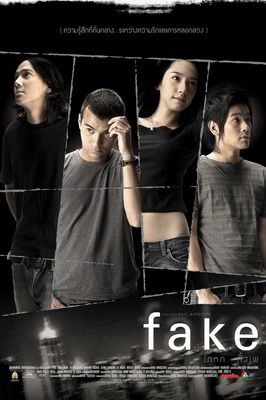
Abb.: Plakat
[Bildquelle: Wikipedia. -- Fair use]
|
"Fake (Thai: เฟค โกหกทั้งเพ) is a 2003 Thai romantic drama film directed by Thanakorn Pongsuwan (ธนกร พงษ์สุวรรณ). It starred Leo Putt (ลีโอ พุฒ = Putthipong Sriwat - พุฒิพงศ์ ศรีวัฒน์, 1976 - ), Ray MacDonald (เรย์ แมคโดนัลด์, 1977 - ), Tah Barby (ต้าร์ บาร์บี้ = Phaopol Thephatsadin na Ayutthaya - เผ่าพล เทพหัสดิน ณ อยุธยา) and Pachrapa Chaichua (พัชราภา ไชยเชื้อ, 1978 - ). The debut feature by Thanakorn, it was screened at the Vancouver International Film Festival, the Stockholm International Film Festival and the Singapore International Film Festival in 2003 and 2004. PlotThree young hipster men who share an apartment in Bangkok are chasing after women, but are unaware that it's the same woman they are after. Cast
[Quelle: http://en.wikipedia.org/wiki/Fake_%28film%29. -- Zugriff am 2013-03-20] |
2003-05
In den Provinzen Yala (ยะลา), Narathiwat (นราธิวาส) und Pattani (ปัตตานี) wird das anwesende Volunteer Defence Corps (Or Sor) (อส. = กองอาสารักษาดินแดน) auf 849 Mann vergrößert.
Abb.: Lage der Provinzen Yala (ยะลา), Narathiwat (นราธิวาส) und Pattani (ปัตตานี)
[Bildquelle: CIA. -- Public domain]
2003-05-01

US-Präsident George W. Bush erklärt den Irak-Krieg für beendet (er dauert noch bis 2011).
Abb.: Präsident George W. Bush an Bord des Flugzeugträgers Abraham Lincoln, wo er das Ende des Irak-Kriegs verkündet, 2003-05-01
[Bildquelle: U.S. Navy photo by Photographer's Mate 3rd Class Tyler J. Clements / Wikipedia. -- Public domain]
Abb.: George W. Bush / von Murray Webb (1947 - ), 2007
[Bildquelle: George Bush. "So no more mistakes!" 13 January, 2007.. Webb, Murray, 1947- :[Digital caricatures published from 29 July 2005 onwards (2006, 2007, 2008). Includes a selection of digital caricatures published from 2002 and up to July 2005.]. Ref: DCDL-0002863. Alexander Turnbull Library, Wellington, New Zealand. http://natlib.govt.nz/records/22660358. -- Zugriff am 2013-03-09. -- "You can copy this item for personal use, share it, and post it on a blog or website. It cannot be used commercially without permission"]
2003-05-05

USA: Start von Linkedin, einem "webbasierten soziales Netzwerk zur Pflege bestehender Geschäftskontakte und zum Knüpfen von neuen geschäftlichen Verbindungen" (Wikipedia). Ab 2013-12 ist Linkedin auch in Thailand und auf Thai vorhanden.
Abb.: ®Logo
[Bildquelle: Wikipedia]
2003-05-06
Das Erziehungsministerium hebt die Frisurvorschriften für Schüler auf. Bisher durften Knaben an Staatsschulen ihr Haar nicht länger als 5 cm haben, Mädchen mussten Haar auf Nackenlänge tragen.
Abb.: Solche Frisuren sind nicht mehr Vorschrift, 2007
[Bildquelle: Colin and Sarah Northway. -- http://www.flickr.com/photos/apes_abroad/352714701/. -- Zugriff am 2011-12-31. -- Creative Commons Lizenz (Namensnennung, share alike)]
2003-05-09
Regierungs-Aktion zur Verbreitung von Computer-Kenntnissen: im Queen Sirikit National Convention Center (ศูนย์ประชุมแห่งชาติสิริกิต) werden 19.000 Computer zu supergünstigem Preis verkauft: PC: 10.900 Baht, Laptop: 19.500 Baht.
Abb.: Lage des Queen Sirikit National Convention Center (ศูนย์ประชุมแห่งชาติสิริกิต)
[Bildquelle: OpenStreetMap. -- Creative Commons Lizenz (Namensnennung, share alike)]
Abb.: Thailand setzt auf IT-Kompetenz, 2006
[Bildquelle: Barb Dybwad. -- http://www.flickr.com/photos/barb/255335897/. -- Zugriff am 2011-12-31. -- Creative Commons Lizenz (Namensnennung, keine kommerzielle Nutzung, share alike)]
2003-05-10

NZZ: Erbarmungsloser "Krieg gegen Drogen" in Thailand : Die Bevölkerung steht hinter dem harten Kurs von Ministerpräsident Thaksin.
"Anfang Februar hat in Thailand ein offiziell angekündigter «Krieg gegen Drogen» begonnen. Ende April zogen Polizei und Regierung Zwischenbilanz. In drei Monaten wurden 17 000 Personen verhaftet, 14 Millionen Methamphetamin- Pillen (ยาบ้า - Ya Ba) sichergestellt und 23 Millionen Dollar Drogengelder beschlagnahmt. Der thailändische Ministerpräsident Thaksin Shinawatra sprach von einem großen Erfolg. Neunzig Prozent des Drogenhandels habe eliminiert werden können. Die Kampagne sei so erfolgreich verlaufen, dass sie bis Ende Jahr verlängert werde, erklärte er weiter und versprach dem König zu dessen Geburtstag am 2. Dezember ein «drogenfreies Thailand». Erschreckend hohe Zahl von Todesopfern
Getrübt werden die Erfolgsmeldungen jedoch durch eine weniger erfreuliche Zahl: Die Anti- Drogen-Kampagne hat bis heute 2275 Todesopfer gefordert. Nach offiziellen Angaben wurden nur 51 Personen, die der Drogenszene zugerechnet werden, von der Polizei in Notwehr erschossen. Die restlichen Toten seien Opfer von Bandenkriegen. Nichtregierungsorganisationen halten diese Version allerdings für äußerst fragwürdig. Sie sprechen von schweren Menschenrechtsverletzungen durch die Behörden und sehen den Rechtsstaat in Gefahr. Mit seiner Aufforderung, erbarmungslos durchzugreifen, habe der Ministerpräsident der Polizei faktisch eine Lizenz zum Töten erteilt. Bei der Anti-Drogen-Kampagne gehe es darum, Zielvorgaben zu erfüllen, ohne Rücksicht auf Opfer. Die Regierung habe schwarze Listen mit den Namen von 45 000 angeblichen Drogenhändlern vorgelegt und Provinzgouverneure und lokale Polizeichefs unter Druck gesetzt. Wer nicht genug mutmassliche Dealer «aus dem
Verkehr» gezogen habe, sei entlassen oder versetzt worden.
Vertreter der Menschenrechtsorganisation Human Rights Watch sind überzeugt, dass die thailändische Polizei mit dem Segen der Regierung Verdächtige kaltblütig umgebracht hat. Auffällig sei, dass viele der Opfer auf dem Nachhauseweg nach Verhören in lokalen Polizeiposten erschossen worden seien. Beim gerichtsmedizinischen Institut in Bangkok beklagt man, dass die sich häufenden angeblichen Morde innerhalb des Drogenmilieus nicht untersucht würden."
[Quelle: NZZ Internationale Ausgabe. -- 2003-05-10. -- S. 6. -- Fair use]
Abb.: ya ba (ยาบ้า)
[Fair use]
2003-05-20
Die Regierung beginnt ihren "war on dark influences", gegen mafiöse Einrichtungen, wie Erpresser-Banden, Schmuggler-Ringe, Untergrund-Kasinos, Bordelle usw.
2003-05-31
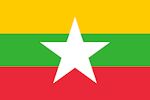
Die Militärjunta Myanmars lässt Aung San Suu Kyi (အောင်ဆန်းစုကြည, 1945 - ်) sowie 19 Mitglieder ihrer Nationalen Liga für Demokratie (အမျိုးသား ဒီမိုကရေစီအဖွဲ့ချုပ်) inhaftieren. Universitäten und Schulen werden vorläufig geschlossen.
Abb.: Fahne der Nationalen Liga für Demokratie (အမျိုးသား ဒီမိုကရေစီအဖွဲ့ချုပ်)
[Bildquelle: Wikipedia. -- Public domain]
2003-06-03

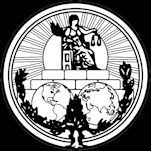
Thailand unterzeichnet ein Abkommen mit den USA, dass Thailand keine US-Staatsbürger vor den UNO Internationalen Gerichtshof (Cour internationale de Justice, CIJ; International Court of Justice, ICJ) bringen wird. Dies obwohl Thailand am 2000-10-02 das UNO-Abkommen unterzeichnet hatte, das eine gegenteilige Verpflichtung enthält.
2003-06-03

Erfindung des Flashmob: "Als ein früher zweckloser (und damit vom Smart Mob unterscheidbarer) Flashmob gilt eine Aktion des Journalisten Bill Wasik (1943 - ) am 3. Juni 2003 in New York. Mehr als hundert Teilnehmer versammelten sich in einem Kaufhaus um einen Teppich. Kaufhaus-Mitarbeitern teilten sie mit, dass sie einen „Liebesteppich“ suchten und Kaufentscheidungen grundsätzlich gemeinsam träfen. Danach versammelte sich eine noch größere Gruppe in einer Hotel-Lobby und applaudierte exakt 15 Sekunden, schließlich strömten die Teilnehmer in ein Schuhgeschäft und gaben sich dort als Touristen aus. Bill Wasik hat in einem Artikel im März 2006 bekundet, seine Absicht sei gewesen, hippe Leute vorzuführen, die in einer Atmosphäre der Konformität nur danach strebten, Teil der „nächsten großen Sache“ zu werden, egal wie sinnfrei diese sei. Die Freude an den sinnfreien Aktionen und der öffentlichen Aufmerksamkeit führte rasch zu Nachahmungen ohne ironischen Hintergrund." (Wikipedia)
Die Idee schwappt auch nach Thailand über.
Abb.: Aufruf zu flash mob, 2010
[Bildquelle: http://www.dek-d.com/board/view/1749954/. -- Zugriff am 2013-11-01. -- Fair use]
2003-06-04
Nachdem zahlreiche Schrotflinten des Volunteer Defence Corps (Or Sor) (อส. = กองอาสารักษาดินแดน) gestohlen worden waren, ordnet der Innenminister an, dass alle an Dörfler ausgegebenen Waffen wieder eingezogen werden.
2003-06-10
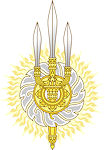
Seine Majestät, der König erhält vom Department of Intellectual Property den Gebrauchsmusterschutz (Industrial design) für "Feces receptacle" (Scheißbehälter).
2003-06-10

Ministerpräsident Thaksin besucht US-Präsident George W. Bush.
Abb.: George W. Bush
[Bildquelle: DonkeyHotey. -- http://www.flickr.com/photos/donkeyhotey/7210988302/. -- Zugriff am 2014-08-27. -- Creative Commons Lizenz (Namensnennung, share alike)]
2003-06-10
Festnahme von drei Personen, die im Verdacht stehen, Autobomben-Attentate auf Botschaften und Tourismus-Einrichtungen geplant zu haben. Sie gehören angeblich Jemaah Islamiya (JI, ญะมาอะห์ อิสลามียะห์) an.
"Jemaah Islamiyah (JI; arabisch: الجماعه الإسلاميه, al-Ǧamāʿ al-Islāmiya deutsch: Islamische Gemeinschaft) ist eine radikale islamistische Terrororganisation, die ihre Ursprünge in Indonesien hat. Erstmals in der Öffentlichkeit bekannt wurde die Organisation, als sie sich zu den Anschlägen von Bali auf mehrere Nachtclubs in Bali im Oktober 2002 bekannte, bei denen 202 Menschen getötet wurden. Entstehung und Hintergründe
Die Jemaah Islamiyah wurde 1993 von Abdullah Sungkar und Abu Bakar Bashir gegründet, während sie sich in ihrem malaysischen Exil befanden. Abu Bakar Bashir und Abdullah Sungkar lernten sich zunächst durch ihr Engagement für fundamentalistische islamische Gruppierungen (Darul Islam und Masyumi) kennen und begannen 1963, zusammenzuarbeiten. Sie gründeten einen Radio-Sender, der konservativ islamistische Lehren verbreitete und sich gegen das damalige Regime unter Suharto aussprach. Dieser wurde von Seiten der Regierung geschlossen. Außerdem gründeten sie eine islamische Schule in einem Dorf namens Ngruki- die Jemaah Islamiyah firmiert deshalb teilweise auch als das Ngruki-Netzwerk. Seit Beginn ihrer Zusammenarbeit wurden Abdullah Sungkar und Abu Bakar Bashir des öfteren wegen Regimefeindlichkeit verhaftet, 1979 wurden sie zu einer Haftstrafe von jeweils neun Jahren verurteilt, weil sie versuchten, die Wahl zu boykottieren. 1982 kamen sie jedoch wegen Berufung wieder frei. 1985 widerrief der oberste Gerichtshof Indonesiens jedoch die Berufung, weswegen Abu Bakar Bashir und Abdullah Sungkar ins Exil nach Malaysia flohen. Dort riefen sie zum Widerstand gegen die sowjetische Besetzung Afghanistans auf und rekrutierten ca. 200 Männer, die sie in den Jihad schickten. 1993 traten sie erstmals offiziell unter dem Namen Jemaah Islamiyah auf. Nachdem Suharto durch die Präsidentin Megawati abgelöst wurde, kehrten Abdullah Sungkar und Abu Bakar Bashir 1999 wieder zurück nach Indonesien, wo sie weitere islamische Schulen gründeten und zum Jihad in indonesischen, malayischen und philippinischen Regionen aufriefen. Im gleichen Jahr starb Abdullah Sungkar, Abu Bakar Bashir wurde zum ideologischen Führer der JI. Nachgesagt werden der Gruppierung auch Kontakte zur Abu Sayyaf, einer islamistischen militanten Untergrundorganisation im muslimischen Süden der Philippinen.
Eine Zusammenarbeit mit dem Terrornetzwerk al-Qaida ( القاعدة) ist teilweise bestätigt.
IdeologieIn einer von Abdullah Sungkar und Abu Bakar Bashir verfassten Schrift mit dem Titel „Die jüngste Krise Indonesiens: Ursachen und deren Lösungen" sind gesellschaftliche Missstände wie z.B. Armut, Arbeitslosigkeit, Missernten etc. auf den moralischen Verfall wie z.B. Alkoholkonsum, lockere Sexualmoral etc. zurückzuführen und als Strafe Gottes für die Missachtung seiner Religion zu betrachten. "Wahren Muslimen" bleiben demnach nur zwei Möglichkeiten: Das Leben in einem islamischen Staat oder der Einsatz des eigenen Lebens für das Erreichen eines islamischen Staates.
Chronik der bekanntesten TerroranschlägeAb 2000 ereigneten sich einige Terroranschläge mit zahlreichen Toten und Verletzten, zu denen sich die Jemaah Islamiyah bekannte. Hier die bekanntesten:
- 24. Dezember 2000: Christmas Eve 2000 Indonesia Bombings: koordinierte Bombenanschlagsserie in den Kirchen von acht indonesischen Städten, in Zusammenarbeit mit der al-Qaida → 18 Tote, mehrere Verletzte. Abu Bakar Bashir wurde angeklagt, aber freigesprochen.
- 12. Oktober 2002: Anschlag von Bali 2002: auf der indonesischen Insel Bali explodierte eine große Autobombe vor einer Diskothek → 202 Tote, mehrere Verletzte. Abu Bakar Bashir wurde wegen Hochverrats zu einer geringen Haftstrafe verurteilt, die drei Hauptdrahtzieher wurden am 8. November 2008 hingerichtet.
- 5. August 2003: Anschlag auf das Marriott Hotel in Jakarta: Autobombe eines Selbstmordattentäters explodiert vor dem JW Marriot Hotel in Jakarta → 12 Tote, 150 Verletzte. Abu Bakar Bashir wird zu zweieinhalb Jahren Gefängnis verurteilt.
- 1. Oktober 2005: Anschlag von Bali 2005: In zwei balinesischen Städten (Jimbaran, Kuta) explodieren Bomben von Selbstmordattentätern → 20 Tote, viele Verletzte, die Prozesse gegen die Täter sind noch nicht abgeschlossen."
[Quelle: http://de.wikipedia.org/wiki/Jemaah_Islamiyah. -- Zugriff am 2011-12-31]
2003-06-13

"An eight-month long US-Thai joint operation culminated on 13 June 2003, with the arrest of an individual in possession of radioactive cesium-137—a substance that could fuel a radiological dispersal device (RDD)—one type of which is more commonly known as a "dirty bomb."[1] Royal Thai Police arrested Narong Penanam, a 44-year-old elementary school principal from the Thailand province of Surin (สุรินทร์), in the parking lot of the Royal Pacific Hotel in Bangkok while allegedly in the act of selling the cesium.[2] The sale was a set-up jointly organized by the Royal Thai Police and the US Bureau of Immigration and Customs Enforcement, the investigative arm of the US Department of Homeland Security (DHS).[3] Although both US and Thai authorities have confirmed that Narong thought he was meeting with a potential client in what appears to be the last of a series of orchestrated contacts, was he actually aiding and abetting potential radiological terrorists? This and other major details remain unclear.
First, the exact quantity of seized cesium still needs to be confirmed. Initially, press reports indicated that a total of 30 kilograms of cesium had been seized.[2] More recent reporting substantially reduces that amount to less than one gram with a radioactivity content of about 75 millicuries,[4] which is far below the security threshold of concern as being considered by the International Atomic Energy Agency and the US Nuclear Regulatory Commission.[5] In other words, unlike 30 kilograms, this amount of cesium-137 would not contribute to a potent RDD.
Thirty kilograms of cesium-137, however, would contain some 2.5 million curies - a level comparable to the quantity of radioactive cesium released during the 1986 Chernobyl accident. A person standing one meter away from 2.5 million curies of unshielded cesium would receive a lethal dose of ionizing radiation in less than a minute. Safely shielding this much radioactivity would require more than 30 kilograms of lead. The lack of any reported deaths from radiation exposure further casts doubt that 30 kilograms of radioactive cesium were seized. The initial press reports apparently did not consider or at least raise the question of the near impossibility of this much cesium-137 being present in the seized package. The package probably contained mostly 30 kilograms of shielding and packing materials, while the amount of radioactive cesium was much less than that figure. Still, as reported by The Wall Street Journal, Thai officials also believe that the cesium seized in Bangkok is part of a larger quantity. In their opinion, two additional larger stashes are hidden with one or more of Narong's accomplices somewhere in Laos.[6]
Other uncertainties riddle this case. It is not clear whether Narong was acting as a middleman on behalf of some criminal organization and if any accomplices were backing him up during the actual sale in Bangkok.[2] Narong denies any terrorist involvement, and initial press reports indicated that both Thai and American authorities have recognized no known ties to terrorist groups.[2] His involvement appears to be financially driven, and Thai police officials said he was expecting to earn $240,000 out of the cesium sale.[7] As for its origin, Narong declared that he received the radioactive material from the aide of a now-deceased Thai Air Force Marshal.[6]
In an 18 June 2003 article published in the Bangkok Post, Praphai Charensuk, the 60-year-old widow of a Thai Air Force Marshal, told Thai authorities that her late husband might have been holding the cesium at some point in early 1997. According to her, around that time the Air Force Marshal had been contacted to help examine a substance suspected of being uranium from Russia. After the Air Force Marshal's death in 2001, Charensuk had received a call from an unknown man claiming to be in possession of the material. The individual also claimed to be planning to return the radioactive source to the Office of Atomic Energy for Peace (OAEP) - Thailand's nuclear regulatory agency.[8] If this unknown man proved to be Narong Penanam or the material analyzed by the Air Force Marshal is established as the cesium recently seized, this would mean that the radioactive material had already been in Thailand for a few years. Moreover, should the alleged Russian origin be confirmed, it might also be possible that the cesium entered Thailand after having been smuggled through Laos.[9] As reported by The New York Times, Narong himself has claimed that the metal box containing the seized cesium had been brought to Thailand from Russia and that it was stored for a period of time in Laos.[2] Laotian authorities deny this allegation.[10]
As for the final recipients of the material, DHS agents based in Bangkok believe in the possibility that terrorist organizations operating in Southeast Asia might be the most interested in acquiring a substance like cesium-137.[2] Several days after the arrest of Penanam, Thai authorities, working with information provided by the U.S. Central Intelligence Agency, arrested three men who allegedly have ties to the Jemaah Islamiah terrorist group. These men were planning to bomb five embassies in Bangkok during the Asia Pacific Economic Cooperation summit meeting, according to Thai authorities.[11]
The cesium-137 seizure in Thailand further illustrates that this isotope has increasingly become an object of illicit trafficking. Commonly found in medical and industrial equipment, cesium-137 has long been high on the list of security-critical isotopes.[12] Both the IAEA and the United Nations have included highly radioactive cesium-137 sources as potent material for building RDDs.[13] The interest of smugglers in radioactive cesium is also confirmed by other illicit trafficking incidents. For example, a few weeks prior to the cesium seizure in Thailand, police in the Republic of Georgia discovered two metal containers filled with strontium-90 and cesium-137.[14] The illicit interest in radioactive cesium dates back several years. From 1993 to 1998, IAEA illicit trafficking data show that 53 seizures of cesium-137 occurred, making up 22.6 percent of all radioactive seizures.[15]
However, these data do not necessarily imply terrorist involvement in all, or any, of this trafficking. While the profit motive appears to be driving the relatively strong interest in such radioactive materials, recent intelligence reports by both the US Central Intelligence Agency[16] and MI5, the United Kingdom's defensive security intelligence agency,[17] point to al Qaeda's continued capability to acquire radioactive materials and commit acts of radiological terrorism. With increased news media attention paid to RDD issues since September 11, 2001, traffickers and terrorists alike may be more inclined to target this material to capitalize on the public's heightened state of alert. In this tense environment, clearing the uncertainties surrounding criminal cases, such as the recent Thai arrest, is more important than ever."
[Quelle: http://www.nti.org/analysis/articles/analysis-june-2003-seizure-cesium-thailand/. -- Zugriff am 2016-04-18. -- Fair use]
2003-06-15 - 2003-11-02

50. Biennale von Venedig. Thailand ist vertreten durch
- den Bildhauer Tawatchai Puntusawasdi (ธวัชชัย พันธุ์สวัสดิ์, 1971 - )
- Kamol Phaosavasdi (กมล เผ่าสวัสดิ์, 1958 - )
- Michael Shaowanasai (ไมเคิล เชาวนาศัย, 1964 - )
- Montri Toemsombat (
มนตรี เติมสมบัติ, 1975 - )
2003-06-18
Premiere des Films Fan Chan (แฟนฉัน, My Girl).
Filmemacher:
- Vitcha Gojiew (วิชชพัชร์ โกจิ๋ว, 1977 - )
- Songyos Sugmakanan (ทรงยศ สุขมากอนันต์, 1973 - )
- Nithiwat Tharathorn (นิธิวัฒน์ ธราธร, 1974 - )
- Witthaya Thongyooyong (วิทยา ทองอยู่ยง, 1973 - )
- Atisorn Trisirikasem (อดิสรณ์ ตรีสิริเกษม, 1975 - )
- Komgrit Triwimol (คมกฤษ ตรีวิมล, 1973 - )

Abb.: Plakat
[Bildquelle: Wikipedia. -- Fair use]
"Fan Chan (Thai: แฟนฉัน, English: My Girl) is a 2003 Thai romantic film offering a nostalgic look back at the childhood friendship of a boy and girl growing up in a small town in Thailand in the 1980s. It was the debut film by six young screenwriter-directors, Vitcha Gojiew, Songyos Sugmakanan, Nithiwat Tharathorn, Witthaya Thongyooyong, Anusorn Trisirikasem and Komgrit Triwimol. With a soundtrack that featured Thai pop music of the era, Fan Chan was the top domestic film at the Thailand box office in 2003, earning 140 million baht. Plot
Jeab, a young man working in Bangkok, receives word that his best friend from childhood, Noi-Naa is to be married. While driving back to his hometown, the memories of his friendship with her come flooding back, and their story is told in a flashback.
Jeab and Noi-Naa live in a small city in Thailand. Their fathers are rival barbers, with shops situated next to each other, with only a sweet shop to separate them. Jeab's father favors efficiency and uses an electric trimmer. Noi-Naa's father, meanwhile, has a more contemplative, artistic approach, and uses scissors. Jeab notes that the results of both methods seem to be the same.
The school holiday is ended. Jeab is notorious for oversleeping, so that each day he misses the school bus and must be driven part way by his father on a motorcycle. By taking a shortcut, Jeab and his father are able to catch up to the bus, but only just in time.
On the bus, other boys are introduced. Their ringleader is an overweight bully named Jack. On the bus, the children talk about what they are going to do after school. The boys decide they will play Chinese fantasy characters, while the girls plan to play "house".
Because Jeab must cross a busy street to play with the boys, and he fears getting hit by a car, he stays to play with the girls, which makes him the target of much taunting by Jack and the other boys.
Then, one day, Jack and his friends are playing soccer against a rival neighborhood gang. They are one player short. Jeab happens to be hanging around, and he's asked to join the game, proving his abilities.
He earns the trust of Jack's gang, and passes various tests in order to join. But the one thing he must do is sever his ties to Noi-Naa. Jeab does so, quite literally, by cutting a rubber-band jump rope, which Noi-Naa is skilled at playing with.
From that moment on, Noi-Naa refuses to talk to Jeab. Then, one day, Jeab gets word that Noi-Naa is moving away. And, of course, on the day she is to leave, Jeab oversleeps and misses the chance to say his final goodbye to Noi-Naa. Jeab then gets Jack and his friends to commandeer a delivery motorcycle and pursue Noi-Naa and her family in their moving truck. But the motorcycle breaks down, and the truck rolls out of sight. Jeab is to never see Noi-Naa again ... until her wedding.
CastTrivia
- Charlie Trairat (ชาลี ไตรรัตน์, 1993 - ) as Jeab (เจี๊ยบ)
- Focus Jirakul (โฟกัส จีระกุล, 1993 - ) as Noi-Naa (น้อยหน่า)
- Charwin Jitsomboon (ชวิน จิตรสมบูรณ์) as Jeab (adult) (เจี๊ยบ ตอนโต)
- Wongsakorn Rassamitat as Jeab's father
- Arnudsara Jantarangsri as Jeab's mother
- Nipawan Taveepornsawan as Noi-Naa's mother
- Prem Tinsulanonda (เปรม ติณสูลานนท์, 1920 - ) as Himself (on television)
- Aphichan Chaleumchainuwong (อภิชาญ เฉลิมชัยนุวงศ์) as Dtee (ตี่)
- Preecha Chanapai (ปรีชา ชนะภัย, 1955 - ) as Noi-Naa's father
- Anyarit Pitakkul (อัญญาฤทธิ์ พิทักษ์ติกุล) as Boy (บอย)
- Yok Teeranitayatarn (หยก ธีรนิตยาธาร) as Manoj (มาโนช)
- Chaleumpol Tikumpornteerawong (เฉลิมพล ทิฆัมพรธีรวงศ์, 1989 - ) as Jack (แจ๊ค)
- Thana Vichayasuranan (ธนา วิชยาสุรนันท์) as Prik (พริก)
[Quelle: http://en.wikipedia.org/wiki/Fan_Chan. -- Zugriff am 2011-12-31]
- Preecha Chanapai (Preecha Chanapai (ปรีชา ชนะภัย) (also known as Lek Carabao - เล็ก คาราบาว of the band Carabao), who portrayed Noi-Naa's long-haired, moustachioed father, reprised his role of a barber in Dear Dakanda, (เพื่อนสนิท) a 2005 film directed by one of the six Fan Chan directors, Komgrit Triwimol (คมกฤษ ตรีวิมล).
- Fan Chan was released in Indonesia in 2006 as First Love, with a soundtrack dubbed in Indonesian and featuring the country's pop music of the era."
2003-06-24

Tod von Voramai Kabilsingh (นาง วรมัย กบิลสิงห์, geb. 1908). Sie war die erste thailändische vollordinierte buddhistische Nonne (bhikkhunī - ภิกษุณี).
Abb.: Voramai Kabilsingh (วรมัย กบิลสิงห์)
[Bildquelle: http://thaimisc.pukpik.com/freewebboard/php/vreply.php?user=dokgaew&topic=3732. -- Zugriff am 20012-06-19]
"Voramai Kabilsingh (Thai: นางวรมัย กบิลสิงห์) (* 6. April 1908; † 24. Juni 2003) war die erste voll ordinierte buddhistische Nonne (Bhikkhuni) in Thailand. Seit ihrer Vollordination in Taiwan 1971 bis zu ihrem Tod 2003 leitete sie das erste Nonnenkloster Wat Songdhammakalyani (Thai: วัดทรงธรรมกัลยาณี) in Nakhon Pathom (นครปฐม) und wurde von ihren Anhängern wertschätzend ‚Luang Ya‘ genannt. Leben
Voramai Kabilsingh wurde 1908 geboren. Ihre Mutter Somcheen war zwar des Lesens und Schreibens unkundig, aber sehr religiös und ließ sich im Alter als Mae Chi (แม่ชี) ordinieren. Voramai genoss eine Schulbildung und wurde schließlich Lehrerin, Journalistin und Schriftstellerin. Nach Angaben ihrer Tochter war sie in jungen Jahren einmal mit dem Fahrrad von Bangkok bis Singapur gefahren. Durch ihre Arbeit als Journalistin traf sie den Parlamentsabgeordneten Kokiat Satsen (Thai: นายก่อเกียรติ ษัฏเสน) aus der Provinz Trang, von dem sie sich aber später trennte. 1956 ließ sie sich von Pra Prommuni im Wat Bowonniwet (วัดบวรนิเวศวิหาร) als Mae Chi ordinieren, trug aber eine hellgelbe anstatt einer weißen Robe. Anfang der 1960er Jahre kaufte sie von der Familie der früheren Königin Indrasakdisaci einige Reisfelder nahe der Stadt Nakhon Pathom, um dort ein Haus zu errichten. Schließlich war sie die erste Frau in Thailand, die 1971 eine volle Nonnenordination erhielt. Sie verwandelte ihr Haus, dem auch ein Waisenhaus und eine Schule angeschlossen war in einen Tempel, in dem auch ihre Tochter Chatsumarn (ฉัตรสุมาลย์ กบิลสิงห์, 1944 - ) und die drei Ziehkinder aufwuchsen. Als sie 2003 starb, konnte sie den Tempel an ihre Tochter, die auch Bhikkhuni geworden war übergeben. [1]
WirkenVoramai Kabilsingh, die auch Jiujitsu (柔術) und den Schwertkampf beherrschte, war eine Pionierin für die Frauenrechte in Thailand, insbesondere was das Recht der Frauen auf höhere Nonnenordination und Bildung betrifft. Sie gilt auch als Verfechterin eines Engagierten Buddhismus. Mehr als 30 Jahre lang publizierte und produzierte sie ein eigenes buddhistisches Magazin, um ihren Ideen Gehör zu verschaffen. Mit einer Speckstein-Manufaktur und einem angeschlossenen Verkaufsmarkt verdiente sie Geld, um den Tempel und die bis zu 80 Nonnen und Waisen im Haus zu erhalten. Sie kaufte noch Land für zwei weitere Tempel, einen in der Nähe in Amphoe Sam Phran (สามพราน) und einen in Lamphun (ลำพูน), in der Nähe von Chiang Mai. [2]
LiteraturEllison Banks Findly (Herausgeber): Women's Buddhism, Buddhism's Women: Tradition, Revision, Renewal, Wisdom 2000. ISBN 0861711653"
[Quelle: http://de.wikipedia.org/wiki/Voramai_Kabilsingh. -- Zugriff am 2012-06-19]
2003-06-27

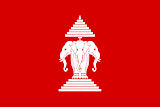
Tod von Anthony Alexander Poshepny aka Tony Poe (geb. 1924)
"Anthony Alexander Poshepny (September 18, 1924 – June 27, 2003), known as Tony Poe, was a CIA paramilitary officer in what is now called Special Activities Division. He is best remembered for training the United States Secret Army in Laos during the Vietnam War. Early life and career
Accurate accounting of Poshepny's career is complicated by government secrecy and by his tendency to embellish stories. For example, he often claimed to be a refugee from Hungary, but was actually born in Long Beach, California. He joined the US Marine Corps in 1942 serving in the 2nd Marine Parachute Battalion and fought in the 5th Marine Division on Iwo Jima,[1] receiving two Purple Hearts. After graduating from San Jose State University in 1950, he joined the CIA and worked in Korea during the Korean War, training refugees for sabotage missions behind enemy lines.
After the Korean war, Poshepny joined the Bangkok-based CIA front company Overseas Southeast Asia Supply (SEA Supply), which provided military equipment to Kuomintang (中國國民黨) forces based in Burma. In 1958, Poshepny tried unsuccessfully to arrange a military uprising against Sukarno, the president of Indonesia. From 1958 to 1960, he trained various special missions teams, including Tibetan Khambas [ཁམས] and Hui (خُوِذُو) Muslims at Camp Hale, for operations in China against the Communist government. Poshepny sometimes claimed that he personally escorted the 14th Dalai Lama out of Tibet, but this has been denied, both by former CIA officers involved in the Tibet operation, and by the Tibetan government-in-exile.
LaosThe agency was impressed with Poshepny's ability to train paramilitary forces quickly and awarded him the Intelligence Star in 1959. Two years later, working under Bill Lair (1924 - ), he was assigned with J. Vinton Lawrence to train Hmong hill tribes in Laos to fight North Vietnamese and Pathet Lao (ປະເທດລາວ) forces. In Laos, Poshepny gained the respect of the Hmong forces with practices that were barbaric by agency standards. He paid Hmong fighters to bring him the ears of dead enemy soldiers, and, on at least one occasion, he mailed a bag of ears to the US embassy in Vientiane (ວຽງຈັນ) to prove his body counts. He dropped severed heads onto enemy locations twice in a grisly form of psy-ops. Although his orders were only to train forces, he also went into battle with them and was wounded several times by shrapnel.
Over several years, Poshepny grew disillusioned with the government's management of the war. He accused then-Laotian Major General Vang Pao (1929 - 2011) of using the war, and CIA assets, to enrich himself through the opium trade. The CIA extracted Poshepny from Laos in 1970 and reassigned him to a training camp in Thailand until his retirement in 1974. He received another Intelligence Star in 1975.
RetirementAfter the war Poshepny remained in Thailand with his Hmong wife and four children. He moved the family to California in the 1990s. He frequently appeared at Hmong veteran gatherings and helped veterans immigrate and settle in the US. He freely admitted his actions during the war to reporters and historians, saying they were a necessary response to communist aggression.
Several press stories have suggested that Poshepny was the model for Colonel Walter Kurtz in the film Apocalypse Now, but both Poshepny and director Francis Ford Coppola (1939 - ) have denied the connection."
[Quelle: http://en.wikipedia.org/wiki/Anthony_Poshepny. -- Zugriff am 2014-10-16]
ausführlich: http://www.payer.de/thailandchronik/ressourcen.htm
Zu Chronik 2003 / B. E. 2546. -- 3. Juli bis Dezember